#and also also that vignette at the end is an edit of one from an old set of vignettes I drew a few years ago
Explore tagged Tumblr posts
Text
i haven't written in a while. but while I was listening to The Bug Collector (cover by Troubador Davis) by Haley Heynderickx I wrote this short piece about being a pinned butterfly
i've only ever known this life. of pins through my body, holding me down never to fly. he puts me in a frame, protected from the elements by the glass, he said. He's probably right, that a life outside my frame would lead to my swift, and likely painful demise. in here i stay lovely on the outside; but inside, i feel myself rotting. starting with my mind, once inquisitive and eager to imagine, i find myself tired of thinking. my lungs grow tired of inflating, my heart weary and aches, beating slower that i think is healthy. my wings are brittle, i doubt i'd be able to fly even if i somehow found a way out. is this what it means to be beautiful?
#i don't tend to edit my stuff much#maybe i change the wording or get rid of a line here or there#but most of the time it's just stream of conscious stuff#i didn't really have a solid metaphor for this one beyond feeling trapped for preservations sake#but there was a bit by the descriptions that were a bit inspired by disordered eating and other habits that stem from insecurity#or mental illness that rots you from the inside and makes you feel like a shell of a person#i'm sure someone could also interpret this as feelings stemming from religious trauma or authority figures#i will say that originally i was going for something more in line with a yandere storyline of realizing that the person was being held#captive by a being that was somewhat like a fairy but definitely inhuman#but i ended up not really going further with this#i'm not impressed with my writing i feel like i try to hard to sound poetic and i'm too simple-minded to write purple prose well#i used to really enjoy writing things like poetry and music when i was very young#i cant quite remember why i stopped i think i stopped feeling inspired for that sorta stuff and just focused on vignettes and drawing#tina writes#poetry
6 notes
·
View notes
Text
For this week's post, I have a very special announcement:
As of the minute of my posting this,
this blog
is officially
A DECADE OLD!
To mark the occasion, I've gone back to my old sketchbook and (at long last!) made a scan of the first drawing I ever posted here...
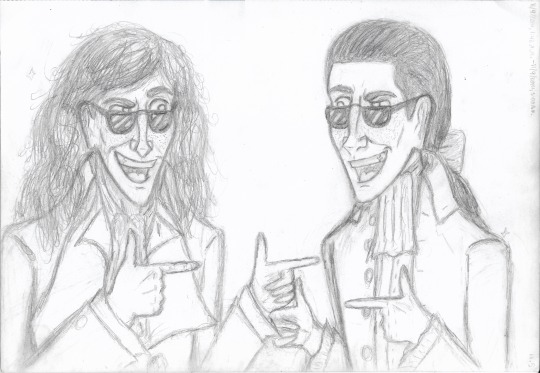
...which I've used as reference for a redraw🥹
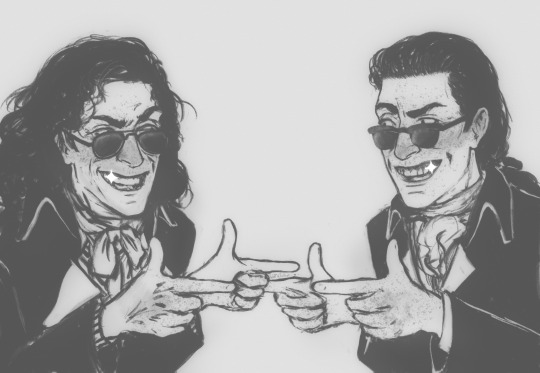
I've been through a lot in the last decade (as you can imagine), and, consequently, the nature of my love for and appreciation of the novel has changed so much through those years; with each subsequent time I've read it, A Tale of Two Cities has meant a different thing to me and held a unique place in my soul, tailored to its shape at that point in time.
That's part of why it has been such an immense, immeasurable joy to have this blog as a constant, a place for me to capture those shapes (and their changing over the years) by providing the good people of Tumblr's A Tale of Two Cities fandom with posts of all varieties. What a wonderful and rewarding place it has been for finding community in which we can all share our collective appreciation for this incredible novel. So if you're reading this, thank you! And I hope this blog has been able to provide for you anything like what it has for me!
Now this post is done, why don't we call a health, dear reader; why don’t we give our toast?

Many more posts - and years - to come, then!
#A Tale of Two Cities#Sydney Carton#Charles Darnay#AToTC#Dickens#classic literature#litblr#Waffle Art#heads up#blogress#redraw#TEN YEARS!!! ONE DECADE!!!!!!!!!!#absolutely surreal#TEN! like 🔟TEN years! WHAT!#also I tried to make the redraw take about as long as the original but I went over by a bit I couldn't help it#and also also that vignette at the end is an edit of one from an old set of vignettes I drew a few years ago#they're somewhere down in the art tag#anyway. just. yeah it kinda speaks for itself but also it doesn't and I could go on and on about all my feelings about this#but I shall refrain! and instead say:#see you next week for another illustrators post! QUEUED this time!#and again: thank you!💜
15 notes
·
View notes
Text

This is a replacement for various TS2 cutscene camera animation resources without bloom, grain, vignette and letterbox /OR with less of those/
NOTE: This mod is NOT an improvement of cutscene animations. It allows clean /or cleaner/ screenshots and that's it.
Less post effects in cutscenes
Download: SFS | BOX
updated 24.01.2025: first kiss scenes were all blurry, I've replaced those.
06.02.2025: Move in animation cutscene was black, I've replaced it.
This mod is still a work in progress! Some effects might switch on and off, also - At the end of the cutscenes anims tend to look glitchy, Sims rapidly changing position etc. That wonkiness is normally hidden by letterbox blackout.
Seems like EA removed sfx from cutscenes in Legacy version. No, actually the sfx is still there, at least for some of you. So it wasn't a feature, only a bug.
More under the cut:

The ugliest of the effects IMO, the filmgrain (especially in dark/night scenery), luckily takes up a few frames at most and was the easiest to get rid of. Well, not always easy to remove, because in some cutscenes effects depend on other effects, like the filmgrain is added with vignette, not filmgrain (???) and vignette creates a mask for the blur effect so if you remove it blur becomes worse - but you can't remove blur cuz it makes entire scene black. It's f*cked up.
Even EA has failed to do that in their Legacy edit which has (some) sfx removed from cutscenes, but not all of it. OK, that's not true, apparently it wasn't a feature only a bug - sfx is still there.
Not all animations have all effects removed. To remove these, you need to click on each effect ('Joint') frame in cAnimResourceConst tab, Sub mesh: (dropdown menu) / Postprocessingmaterial and set parameters to zero.
Usually that's one, or a few more frames, but for some anims it's 60, 80 or even 289 frames (letterbox, enter college without parent anim) - so I've skipped most of those.
Replacement contains resources:
o-cineCam-alienAbduction_anim o-cineCam-proposeReject_anim o-cineCam-graduationParty02_anim o-cineCam-cinematic-EnterCollege-withParent-2_anim o-cineCam-firstKissTeen_anim o-cineCam-alienBirth-2_anim o-cineCam-homeBirth_anim o-cineCam-hotTubPlayInF2M-2_anim o-cineCam-hotTubPlayInF2M-1_anim o-cineCam-firstKiss_anim o-cineCam-cinematic-EnterCollege-withParent-1_anim o-cineCam-weddingReject_anim o-cineCam-graduationParty01_anim o-cineCam-moveIn_anim o-cineCam-alienBirth-1_anim o-cineCam-hotTubPlayIn-1_anim o-cineCam-weddingAccept_anim o-cineCam-a-cinematic-enterCollege-noParent_anim o-cineCam-ProposeAccept_anim o-cineCam-hotTubPlayIn-2_anim o-cineCam-returnFromAbduction_anim o-cineCam-ProposeMaleAccept_anim o-cineCam-playInBed_anim
In case of some effects, if they take up many frames - usually letterbox - it's not enough to zero frame parameters, you gotta go to raw view and zero leftover parameters in there too.

Also, as mentioned above, removing one effect can mess up another.
464 notes
·
View notes
Text
riddle and how he views his mother

Consider this a part 2 to this analysis! A while ago, I was asked "Why doesn't Riddle resent his mother?", which is the question that the original analysis answers.
Recently, Riddle's Night Sky's Chiffon vignettes were released into the world, and it contains a lot of interesting details that expand on how Riddle views his mother. I wanted to commentate on this new information and how it supports what I said in the original post.
The topic of mothers comes up in these vignettes. Deuce, who was talking about his own mom, quickly realizes that it's awkward to mention parents in front of Riddle, so he apologizes. To his surprise, Riddle is super chill about it and tells Deuce he doesn't really mind, so be at ease. And then Riddle states it outright, clear as day: "I'm grateful to my mother."
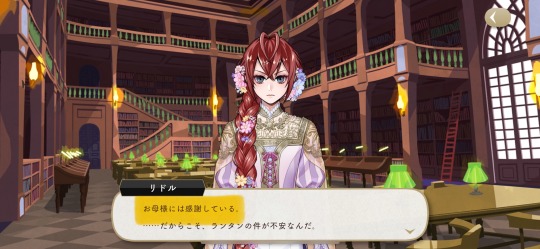
Deuce follows up with a comment to the effect of, "It looks like moms are strong in every family", to which Riddle actually agrees.
Riddle credits his mom for his ability to do many things in the present. For example, he took gymnastics classes so he was able to pull off the ballet in this event (one of the Princess in the Tower's required activities). He also learned social dancing, which comes in handy for formal events such as Ghost Marriage and Glorious Masquerade. Most notably, Riddle excels in academics--he is noted as being top of this grade multiple times, has prevented any students in Heartslabyul from dropping out, and is able to memorize 3 magic engineering/coding textbooks in only just a few minutes + helps to keep Malleus at bay in a recent main story update--something which no one else would be able to achieve. He's also able to cast powerful spells in quick succession as the result of his magical training from a young age. It can be argued, then, that despite Mrs. Rosehearts' methods, she did ultimately instill many useful skills in Riddle to set him up for success as a mage. He recognizes the value in that, and acknowledges her for it. There is always a part of Riddle that thinks he is a "better" person today because of his mother's discipline, even if he is just now starting to question her methodology.
He is disciplined and capable because of his upbringing--this cannot be denied. And Riddle can't find it in himself to resent his mother because of that. This woman raised him and taught him all these things because she genuinely believed this was what was "best" for him. How can he hate her for that? For just doing what she thought was her "best"?
I also want to point out how Riddle and his mother are shown to be "one and the same" in these vignettes. Later on, Riddle expresses that he wants to send out a mass email commanding all the Heartslabyul students to prepare at least 10 lanterns each to release in the night, or else there will be punishment awaiting them. He worries that the mobs won't be motivated to help without the threat of a punishment looming over them. Sure enough, when Trey and Cater pass on Riddle's order, the mobs complain and talk about how much nicer it is around Heartslabyul without the dorm leader breathing down their necks. However, the two third years then remind the mobs that while Riddle is strict, he HAS helped them. He provides test notes, edits essays, and hosts study sessions for his dorm members. The mobs eventually realize they need Riddle around, so they end up pitching in and getting those lanterns.
THIS IS PARALLELING MRS. ROSEHEARTS. Like his mother, Riddle is very strict with those under his care--but it comes from a place of his "love", from wanting to see them succeed. And, like Riddle is with his mom, the mobs cannot detach themselves entirely from their dorm leader. I know that book 1 primarily paints Riddle adopting his mother's attitude as a toxic thing (and it is, when it gets out of control)--but with moderation, it also has its useful applications, as we see in these vignettes.
Now let's not get it twisted; none of this erases the absurd restrictions imposed on Riddle, her intense rage, or the child neglect/abuse committed. What I am saying is that she is a person too, not a blob of all things bad in the world. She deserves grace and to have her positives acknowledged too--and this naturally feeds into Riddle's complicated feelings about her, especially now that he sees her bad sides... something he never really faced before.
Riddle's vignettes end on a hopeful note, though I don't know if the characters themselves realize the implications of it. The final scene takes place with the lantern-filled sky, and Deuce wondering why the Princess in the Tower grew her hair out so long to begin with. Was she planning to escape all along? But Jack explains that the witch that kidnapped her wanted the Princess to grow her hair long. The Princess in the Tower obeyed this wish, even though maintaining such long hair is a hassle. To this, Deuce comments that she really must have seen the witch as her mother. Riddle then says that no matter how precious the hair was, it's still cumbersome. "She can't even walk like this." AND THEN RIDDLE JUST CASUALLY SLICES HIS HAIR OFF, NO HESTIATION... ONE CHOP. Deuce panics because the ends look ugly, but Riddle simply replies there's no need to worry, "I do not need long hair anymore."
DO YOU REALIZE WHAT THAT MEANS???????? ? ??? ? ????? Long hair is the symbol of Rapunzel's oppression. It is something she maintains because her oppressor, Gothel, told her to. But long hair is also what ultimately frees her from the tower. The same is true of Riddle. He largely does what he is told to by his mother, believing that she is always correct. Riddle almost doesn't leave the library (despite the long hair being an easy way out) because "I've decided. Never again." He's so close to locking himself up in that metaphorical tower and not allowing himself out for fear of incurring her wrath for disobeying. And in the end, Riddle is still able to leave that tower. He so easily slices his long hair, something which prevents the Princess--HIM--from walking. But in severing that thread, CUTTING THE HAIR, he is freeing himself and finding a way to walk independently.
Maybe Riddle can't do it today (as he so clearly still respects his mother and all that she has done for him)... maybe not tomorrow, either... but someday. Someday...!! Someday, Riddle will be able to "cut his long hair" and walk on his own 😭 and then his life will truly "begin"... Why this nuanced writing get shoved into a vignette and not in the Wish Lantern event story itself, I'LL NEVER UNDERSTAND--
#disney twst#disney twisted wonderland#twst#twisted wonderland#book 1 spoilers#Riddle night sky's chiffon vignette spoilers#wish lantern spoilers#Deuce Spade#Riddle Rosehearts#Jack Howl#notes from the writing raven#tw // child abuse#twst analysis#twisted wonderland analysis#twst character analysis#twisted wonderland character analysis#Rapunzel#Gothel#tw // child neglect#Trey Clover#Cater Diamond
395 notes
·
View notes
Text
quick & easy lightroom walkthrough or: shooting through dirty double-paned glass, and other hardships.



I'll tell you! (Original post here.)
✱ KIT Panasonic GH5 + LEICA DG 100-400 with rubber hood for shooting through windows.* ✱ SHUTTER 1/125 sec ✱ APERTURE f/6.3 ✱ ISO 1600
*I use this one. It works for me, but it's a little tricky. It was a gift, and I think if choosing for myself I'd find something easier to get on and off.
WHAT'S ALL THIS, THEN? It was cold outside, obviously. And the flickers bolt if I try to open the back door, so sometimes I'll post up in front of my dining room window and just get the best shot I can. I do this less and less these days, now that my arthritic hands and I have heated gloves. The 'after' photo is a brand new re-edit using better tools than were available when this was shot. I was never happy with how it looked, before now.
under the cut: EDITS
✱ Detail: Sharpness & Noise Reduction My main problem here is sharpness. The photo is in focus, but because I'm shooting through a thick storm window, I've lost that tack-sharpness I really want, and I have a whole bunch of noise to contend with. This would always be the case, but worse depending on the camera you're using, and in my case this was two generations ago - the GH5. I have tested window shots with the GH7, and they're a lot cleaner.
That being said, the trick is to always, always, always use masking along with sharpening. Like, a lot of masking, just so much masking, so that you avoid sharpening an already-noisy background. In Lightroom, you can hold down down the ALT key while using the masking slider to visualize exactly what is being sharpened.
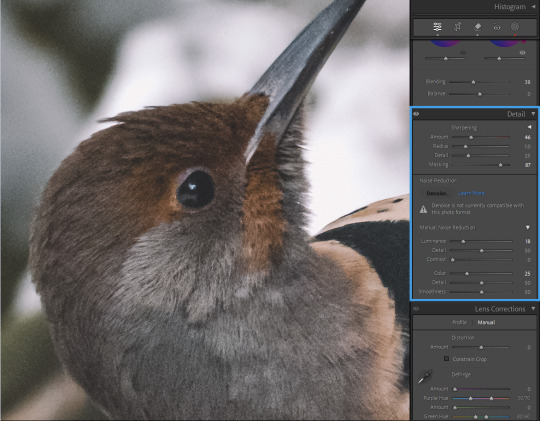
I'm choosing to leave the background noisier than I prefer, because even if I mask out the background, as I increase noise reduction, I lose detail in the edges. Leaving some noise in the feathers also preserves that sense of sharpness, generally.
This is a matter of personal preference and priority in your edits. I've had students absolutely hammer their photos with denoise and like it that way, and that is totally their call. I like it sharp.
Note: you could also do the sharpening/noise reduction at the end, after all your other edits, so that you have a better sense of how much you still need after toning. That's often my preference. I probably went backwards here only because I've edited this image before and had it pre-loaded in my brain.
✱ Tone Dehaze is the real MVP here. You could go even harder than I have on -blacks/+clarity/+dehaze, for a dramatic, crushed look. I decided to strike a balance between the soft darks I prefer but the clarity absolutely needed to make this look less smooshy. And my curve is pretty gentle.
Before toning and after:

(You can see that I've also done some color grading. But because that part is entirely personal preference, I'm skipping it here.)
✱ Selective Adjustments With a photo as flattened as this one, I always want to add some depth to it with masking. I have just three masks in this case:

1. The tree was blown out, detracting from my subject and looking, frankly, unrealistic. So I've darkened this on its own, so that my subject will stand out.
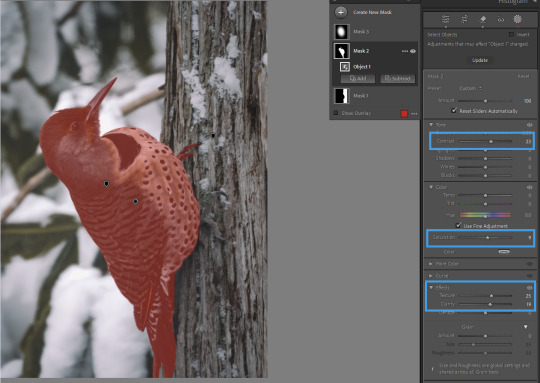
2. Contrast, texture, and clarity to bring out the detail in the feathers; a touch of saturation because the global color grading I wanted took away slightly from the bird's natural coloring. I want this on a mask, and not globally, because I do not want to exacerbate the noise in the background, or the texture of the leaves and snow.
And 3., to make the flicker really pop, I've got a 'spotlight' mask
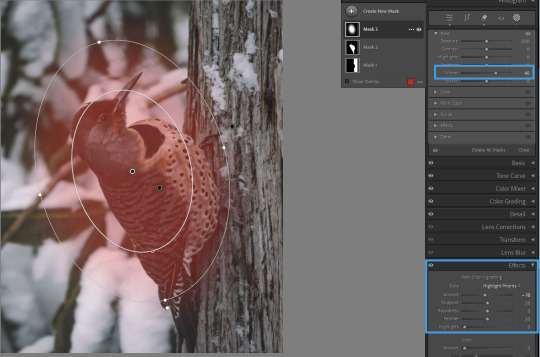
...which is working together with a light vignette to draw the eye to the subject. You could also create an asymmetrical vignette with an inverted -exposure mask, if you needed to.
All together now...

And that's it!
As always, please feel absolutely free to send any questions to my ask box. I try to watch for comments and questions in the tags, but sometimes they get missed. And if there are any other edits you'd like to see, let me know!
Find my other walkthrough here.
#on photography#photography#pnwander edits#lightroom classic#editing tips#photography tips#pacific northwest#pnw#nature photography#wildlife photography#photographers on tumblr#lensblr#how to#lightroom#original photographers#naturecore#photoshop#mine: photos
50 notes
·
View notes
Note
Do you have any favourite fics? I’m on the hunt for new recs, please help 🙏
Happy to serve! Sorry it took me few days, this is one hell of a week work-wise for me right from Monday 😮💨 Oh you don't know how much I love talking about all the amazing fics out there. I picked up some of my faves, but also the ones that I feel are not so well-known and didn't see them making it to other fic rec lists.
Most of them are locked, so you'll need an AO3 account.
Little Birds by CoolPaisley This one is detective AU. Be warned, because I LOVE AUs, so they will make appearance several other times in this list. This one is Miles as a detective and Alex as a failed drunkard novelist. The plot goes little bit over the top at the end, but I still love the premise and the way it's written; when reading it, I was really smitten by how much it's different from other fics in Milex fandom. I also enjoy when they're portrayed as faulty people doing regrettable things and acting foul (and human).
All These Twenty Years on a Vacation by affectiontorend Great oneshot in a form of voice message that'll leave you with bitter taste in your mouth.
Factory Settings by Lizz_88 Where should I start… I think Lizz_88 is the best writer out there, the literal level of this one is touching high heavens; it's brilliant, every sentence, every metaphor in its right place, and it's not overdone. Just beware, because the story itself is very dark and brutal and the subject of extreme masochism/self-destruction is touched. Also the only story I cried to (party because I didn't want it to end, partly because it really is tragically touching. Ouch my heart.)
Drown My Secrets in the Thames by Lizz_88 The newest story by Lizz_88. Read it, because she truly is a terrific writer and since it is kinda recent, I think not enough people have give it love (and kudos and comments).
The Italian Job by stereobone Perfect mixture of small, slow-rolling plot, tension between Alex and Miles, domesticity and sexy times. Oh and I've got soft spot for all the fics set in Italy and Sicily ❤︎
Come Closer by KattyLashes Stand-alone little AU in which teacher Alex goes on a blind date and meets Miles. Katty has huge portfolio of Milex fics, but I especially like to come back to this one. And what I like about Katty is you can really feel how much she enjoys writing these two.
Good for It by ReconciledViolence An AU scene--a vignette--set in crimi and noir tone. It's nothing but a steamy snippet, but I love it. I love both Miles and Alex are painted as a characters with somehow dark background and you can fantasize what was before or what might come next.
The Reinvention of Amerlie Jonquille by LaNaturalBreezeOf_Book A must-read. It's an amazing saga of 'what could possibly be' and a take on creating TLSP3. I won't say anything else, just go and read it. Read everything by LaNaturalBreeze by the way.
edit: I'll probably make part 2, just have to dig around a bit in my memory and gather up another round of stories.
34 notes
·
View notes
Text
What's "Filler" vs What's Relevant
Anonymous asked: How do you know when something is “filler” that needs to be deleted, or if it can be kept? I often see advice saying "your characters should talk about nothing but the plot... no frivolous banter or silly arguments, because it's useless, self-indulgent, filler-fluff." But then I watch or see things and it's like, hm... there sure are a lot of things happening here that aren't plot relevant, yet the audience adores it. For example, in a popular episode of Avatar: The Last Airbender, called "The Tales of Ba Sing Se," nothing relevant to the main plot (stopping Fire Lord Ozai) happens. Instead, characters shop and go to a spa, rebuild a zoo, and go on a date. Part of the episode is even dedicated to one character's running off after having a nightmare. Nothing that we learn or that happens in the episode is ever relevant again as far as I recall, yet 19 years later, people still talk about how much they love that episode. So, I’m really confused as to what counts as useless filler/fluff vs what's important information. How do you tell the difference?
[Ask edited for length...]
First, it's important to note that a Nickelodeon cartoon from twenty years ago is not a great measuring stick for how to write fiction in 2024. ATLA, from what I've heard, is an amazing TV show, full of heart and top-notch character development. But it was also a cartoon created for and written to be enjoyed by children as young as age seven (the low end of Nickelodeon's demographic at the time), so it was following different guidelines from what you'd be following if you're trying to write a short story, novella, or book.
Case in point, the ATLA episode "The Tales of Ba Sing Se" is what's known in television as a "vignette," which uses short, self-contained stories unified by concept and theme to explore character relationships, growth, world-building, and to expand on themes that are important to the overall story. So, while the episode may not have contained plot-relevant elements, as get a glimpse into the minutiae of the characters' daily lives in Ba Sing Se, the characters and their relationships are still pushed forward, even if in only the tiniest ways.
And, again, this is a TV show with 61 episodes, not a short story, novel, or book, all of which are structured differently than a TV show.
On the Subject of "Fluff"
I want to be clear about the fact that if you're writing fan-fiction, fluff is just fine. And even if you're writing original fiction, you can get away with a little bit of fluff... you just need to be clever about it...
Filler, Fluff, or Relevant?
If something is absolutely necessary to move the story forward or understand it, it's plot relevant.
If something doesn't move the story forward and isn't critical to the reader's understanding of the story, but it helps them understand the characters or world in a way they didn't before, it's probably fluff that's been dressed up in a plot relevant costume. (That's the "you need to be clever about it" bit from above, which we'll get to in a second...)
If something isn't necessary to move the story forward or understand it, and it doesn't add anything to the reader's understanding of the characters or world, it's filler. It's just words on a page that serve no purpose, and it should be cut.
On the Subject of "Moving the Story Forward"
To clarify, in case anyone is wondering, "moving the story forward" means advancing the plot from one scene to the next scene. In other words, to use The Hunger Games as an example, Prim's name being drawn in the Reaping moves the story forward, because it forces Katniss to volunteer in her place. It moves the story from Katniss being a bystander at the Reaping to being a tribute. Another example, using Twilight, when Tyler's van skids into the parking lot and almost smashed into Bella, it forces Edward to use his otherworldly vampire strength to save her, which confirms in her mind that he's not human. It moves the story from Bella being curious about this weird boy at school to realizing he is something else and wanting to know more.
Dressing Up Fluff to Make it Relevant
Let's say you're writing a story about a young woman who stayed in her small town and went to community college while her high school besties went off to a college she couldn't afford, and now they've returned and she's trying to maintain these important friendships while struggling with feelings of resentment, jealousy, and feeling left behind.
Now, let's also say you have an idea for a really cute scene where your protagonist and one of these friends goes to a museum together for an afternoon. And as it stands, nothing plot relevant happens in this scene and it doesn't add anything to the reader's understanding of the characters or world. It's just something silly and fun you think would be cute in your story. How can you turn it from fluff to relevant?
To start with, look at your character's internal conflict... wanting to maintain the friendship while struggling with jealousy and feeling left behind. What could happen in the museum that could play on that? Maybe they stop in front of a reproduction of the Venus de Milo and the friend starts talking about the semester abroad she and the other friends did in Paris. This is a perfect place to explore the protagonist's feelings of jealousy and being left behind. If the character talks about her thoughts and feelings in that moment, either inside her head or with the friend, it gives you a chance to expand upon these feelings, explore why they're happening, and even to add further conflict. Maybe she confronts the friend and it doesn't go over well. Or, maybe she lies about something to feel better about herself, and that creates problems later.
Another option would be to look at the next plot point that needs to happen. Is there some way this scene can be used as a stepping stone between two existing scenes? Could something be added to this scene that raises the stakes or or makes the next scene more interesting?
While I'm sure there are some scenes you just can't make relevant no matter how hard you try, usually you can find a way if you just take the time to brainstorm and try out different ideas.
One Last Note...
On the rare occasion you end up with a fluff scene that has no relevance and can't be made to have relevance no matter how hard you try, write it anyway. Then, take it out, save it someplace safe, and hang onto it. These kinds of stories make GREAT incentives for things like newsletter sign-ups, subscription perks, web site bonuses, etc.
I hope that helps! ♥
•••••••••••••••••••••••••••••••••
I’ve been writing seriously for over 30 years and love to share what I’ve learned. Have a writing question? My inbox is always open!
♦ Questions that violate my ask policies will be deleted! ♦ Please see my master list of top posts before asking ♦ Learn more about WQA here
138 notes
·
View notes
Text
Major Arcana Masterlist / Reading Guide
Now that The Rebel Path is complete, I figured I'd make a masterpost for all my fics that exist within the same continuity/canon.
These are all collected under my Major Arcana series, so make sure to subscribe because I'll probably keep adding to it!
Suffer Me - This is a Silverdyne one-shot set during Samurai's heydey that delves into Johnny and Kerry's toxic relationship dynamic.
Isometric Air - A prequel to The Rebel Path focusing on V's relationship with Jackie, told in a series of vignettes.
Practical Heart - A smutty one-shot bonus chapter for The Rebel Path that is essentially just a rewrite of the first smut scene in The Rebel Path from V's POV. Also functions as a standalone one-shot or a teaser for The Rebel Path.
The Rebel Path - The main meat of this thing. Massive SilverV longfic that covers Johnny and V's relationship throughout the game, plus a reworked ending and aftermath.
Persuasion of the Undecided - A smutty bonus chapter for The Rebel Path. Best read after Chapter 38 of The Rebel Path.
This game/these characters will never not have me in a chokehold! Hopefully you enjoy reading about them as much as I enjoy writing them!
Since this is my pinned fic masterpost now I guess, I'm editing it to add in my Solavellan WIP longfic as well.
Wildest Dreams - This thing started as a one-shot I wrote in 2015 and now has spiraled into a Veilguard rewrite featuring my Lavellan as the protagonist in place of Rook.
And I guess I'm writing for Rogue Trader now, too!
Modular Astronomy - A Heinrix/Rogue Trader one-shot set during the Magnae Accessio featuring space regency vibes, mutual pining, ballroom dancing, and sloppy makeouts.
My DMs and Asks are always open! Feel free to reach out with question, prompts, requests, or just to chat about SilverV or Solavellan or anything else!
#cyberpunk 2077#my fics#cyberpunk 2077 fic#cyberpunk 2077 fanfic#cyberpunk fic#fanfic#fic#fanfics#fan fiction#ao3 fic#fanfiction#johnny silverhand#vero verne#female v#v#silverv#cp2077#cp2077 fic#cp2077 fanfic#cp 2077#johnny/v#johnny silverhand/v#kerry eurodyne#silverdyne#silvervdyne#v cyberpunk#dragon age#solavellan#solas#solavellan fanfic
26 notes
·
View notes
Text
So Let's Talk about Pietro and Crystal...
In this meta I am going through Pietro Maximoff's relationship with Crystalia Amaquelin. This meta is not just going to focus on their interactions with one another but also on the ways that they talk about one another and on the culture/societal structure of the Inhumans and Crystal's privilege which are both major factors in this relationship. This reading list is going to have to be in parts just due to how much there is to talk about in these issues and I want to be able to share images freely! The only edits to any panels have been to arrange them in such a way that they easily fit in a tumblr post and to condense panels from the same comic into one image. The content of any panels has been unchanged, and all panels within the same image are displayed in they order they are found within the original printed comic.
Meta below the cut! This one's a doozy.
Pietro and Crystal's first meeting and then subsequent early courtship happens entirely off page between the events of The Avengers (1963) #104 and The Fantastic Four (1961) #131-132. Within The Fantastic Four (1961) #131 we get like little flashbacks in a handful of pages telling us that this has happened and giving us vignettes into how, but it doesn't really provide us with any particular details- which means that going into Fantastic Four (1961) #131, we know about as much as Johnny Storm (The Human Torch), Crystal's boyfriend.
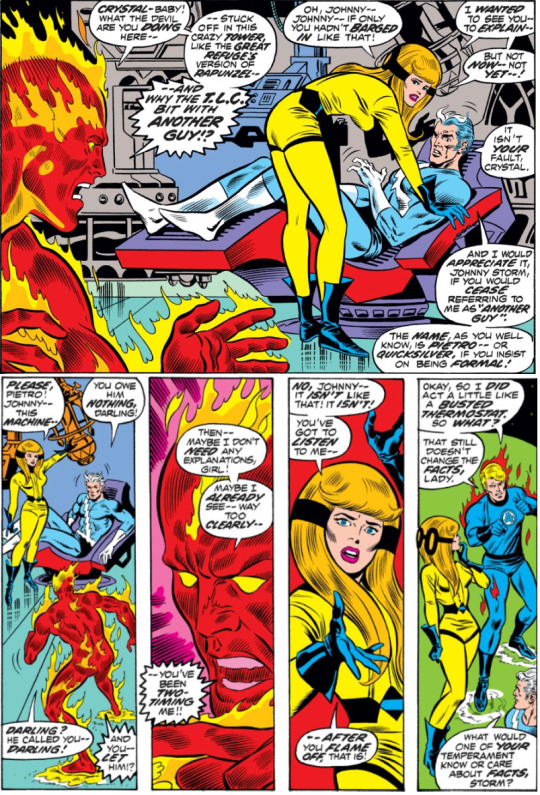
The Fantastic Four (1961) #131
Which is to say that we know that he's come back from a mission only to discover that his girlfriend has been getting cozy with another guy. To Johnny's credit here, he's first mad at Crystal and not at Pietro who as far as we the reader can tell, had no idea that Crystal was dating the Human Torch. Pietro however.....despite clearly realizing that he's the side-piece is still defending Crystal and it's only after his defense of Crystal's decision to be a messy cheater that Johnny decides the two men have beef.
Within #131 we learn that Crystal found Pietro following some intense injuries sustained in a battle with a Sentinel (during a period of comics in which the Maximoff twins keep miraculously losing access to their mutant abilities at the drop of a hat for plot reasons?) and had nursed him back to health and during the days she spends at his bedside helping him recover, in which Crystal apparently decides he's the one while he's unconscious as the other Inhumans (particularly Medusa) around her begin to call her out on her reasons for wanting to stay by Pietro's bedside.
Crystal and Johnny have a conversation where she begs him for more time, and he reminds her (not unfairly) that she's had years of their relationship to think it over and that "if you don't love me- and only me- by now, it's time for me to read the handwriting on the wall." I'm not saying Pietro didn't see the red flags, I'm just saying he might be colorblind.
Within this issue we also get a taste of the Inhuman practice of slavery, wherein they place "Alpha Primitives" beneath them and we get to see the beginnings of an uprising (yay!), the uprising is presented as a bad thing and we're supposed to sympathize with the slavers (boo!). Johnny is portrayed here as being pro-slavery while Pietro is significantly more sensitive to the whole reality of their being enslaved. This being said, Pietro is still upset that the Alpha Primitives have taken Crystal captive and plans to save her, calling her "the girl I love." Johnny pretty rightfully points out that it's been only a few weeks of Crystal and Pietro knowing one another and Pietro....well...by this point we know he rushes into things. Pietro and Johnny run accidentally headfirst into each other during the revolt and Crystal is only concerned about Pietro's wellbeing and almost makes a threat against Johnny, even though it was Pietro who ran into the Human Torch.
The Fantastic Four (1961) #132 ends with Crystal basically going "this massive enemy that we've been fighting is powered by our own inherent guilt over being greedy enslaving racists (a guilt which has not been shown on page at ALL)." Somehow calling this out and actually triggering guilt does not at all further power their enemy but instead leaves him as an immobile statue and a reminder of how fucking racist they are- and then the Alpha Primitives are sent back down into the caves they live in without any form of reparations: "While the Alphas, free men now, return to their nighted catacombs...their own world...dark, but theirs no less for that. One day, they'll come again into the light and take a proffered brother's hand. One day...but not today." It should be noted, that the Inhumans do absolutely NOTHING to "proffer a brother's hand" in this issue, they just walk away from the Alphas and the Alphas go into their dark caves. In fact, the only Inhuman who seems to have had any kind of fondness for the Alphas is known shit-stirrer, Maximus who is kept in a perpetual open-air prison because none of them trust him. And Maximus was the one who built the machine that's supposedly powering Omega (the big enemy) but it's implied up until Crystal's speech that it is actual physical acts of violence against the Alphas that powers Omega.
Pietro ends this first big Crystal saga, brooding and moping because Johnny Storm has friends and he doesn't (he does...sorta, they're just not with him right now) , and Crystal breaks up with Johnny. And Johnny...does a complete 180 from #131 and is like "oh yeah actually I'm not at all upset that you cheated on me and I was hoping you'd break up with me and actually I have a date with my ex girlfriend tonight." Johnny does cry when he sees Crystal with Pietro, but that's really all we get for the end of their relationship. And for whatever reason the narrative seems to wrap itself around Crystal to make her look good.
Literally one issue later in The Avengers (1963) #110- this happens:
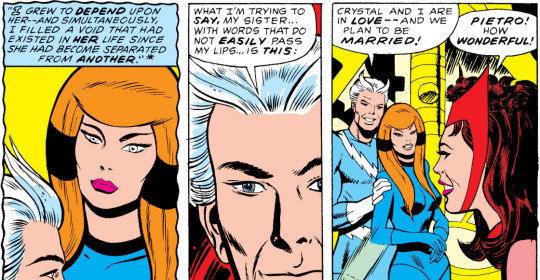
The Avengers (1963) #110
Within this issue Steve Englehart makes the BOLD move to position Pietro as some domineering patriarch when for literally every other appearance he's had with Wanda he has never ONCE positioned himself as "the head of our family." Pietro has up until this point been firm that he and Wanda are equals and just a few issues prior had issued the statement that he would never again even jokingly refer to her as "little sister."
Then in The Avengers (1963) #127, Pietro fails to invite the Avengers to his wedding with Crystal because he's fighting with Wanda and is deemed an "arrogant, posturing fool" by the Inhumans, we're told that Gorgon has "endured a great deal from Quicksilver...for many months." There's only one problem with that, in the blink and you'll miss it Pietro appearances that happen between The Avengers (1963) #110 and the current issue- (Marvel Team-Up (1972) #11 and The Incredible Hulk (1968) #175) We have seen Pietro be nothing but helpful to the Inhumans. And we have seen his help and expertise ignored when it comes to enemies he has fought previously. We have no indications whatsoever that Pietro has been anything but loving and focused on Crystal. It should also be noted that when Gorgon finds out that Pietro didn't invite the Avengers he starts nearly destroying Avengers Tower.
At the wedding, we learn that CRYSTAL HAS INVITED HER EX-BOYFRIEND, JOHNNY STORM, TO HER AND PIETRO'S WEDDING. Johnny is very much a mature adult about things and tells Crystal that if she's happy, he's happy for her. Which is great and lovely and another tick on the box for why I'm a Johnny Storm fan BUT-
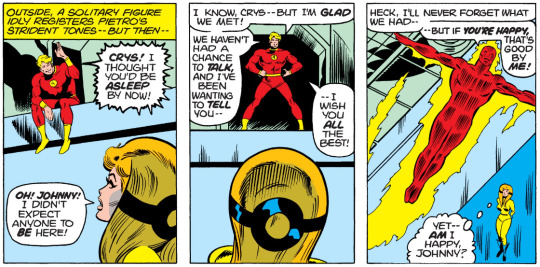
The Fantastic Four (1961) #150A-B
Crystal is about to get married and is now suddenly confused about if she's happy or not? That little vague anxiety is never resolved in this wedding arc and in Fantastic Four (1961) #150B, Pietro and Crystal are married. But even the comic is aware that readers might not be thinking this is a happy ending and have an entire panel dedicated to trying to convince you this is happy.
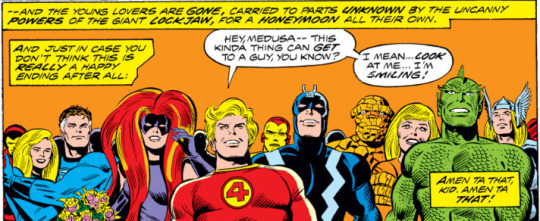
The Fantastic Four (1961) #150A-B
Regardless, these early Pietro/Crystal appearances offer us even more insight into the bigotry on New Attilan. At the beginning of The Avengers (1963) #127, we're told that Black Bolt (who cannot speak) has issued a number of reforms meant to create equality between ALL Inhumans. But upon our first looks at the Alphas, the former slaves of the Inhumans, we see that they're talking of genocide. The genocide mention isn't really resolved here either.
We find out in Fantastic Four (1961) #158 that Pietro marrying Crystal was not enough for him to gain acceptance among his wife's people but that he had to be made an Inhuman by special decree. And yet- Pietro is chained and is willing to die for the Inhumans. "I am an Inhuman since the day of my marriage. From that day until forever, I will live or die- an Inhuman!" This is a sharp contrast to Pietro's issues with the concept of mutant identity that have previously been expressed in: Avengers (1963) #16, Uncanny X-Men (1963) #27, Avengers (1963) #45-49, and Uncanny X-Men (1963) #43A-45A. It's safe to assume that part of Pietro's undying and unearned loyalty to the Inhumans is based around his rushed relationship with Crystal.
I've mentioned above that I don't think Pietro didn't see the red flags, but that he might be colorblind and I'm going to go a little further into that here. Pietro falls in love with Crystal because she is kind to him and nurses him back to health and he's obviously very attracted to her. Crystal falls in love with Pietro while he is unconscious and dependent on her. Even though Pietro is aware that he's essentially Crystal's side-piece in this whole relationship kerfuffle from Fantastic Four (1961) #131-132, he's emboldened by the fact that Crystal chose him. Pietro struggles with self-worth issues (we can see these manifested as well in those mutant identity issues listed above) despite his bluster and pride, and we can see some of that desire and craving to be picked, to be worthy, to be loved, come through in The Amazing Spider-Man (1963) #71. But we've also seen so far, how Pietro's loyalty and love for these people who "picked him" by virtue of their princess "falling in love" with him, is largely one-sided as the Inhumans do NOT share his sentiments.
Case in point for Pietro's feelings and attachment to Cyrstal.
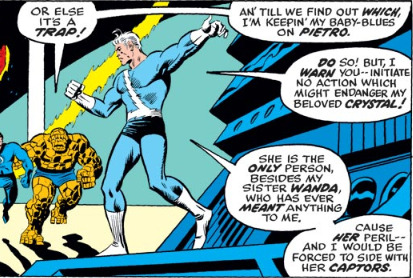
The Fantastic Four (1961) #159
Pietro interacts with the Avengers again in Avengers (1963) #137 where he's informed of Wanda's marriage to Vision and is asked to return to the Avengers and leave Crystal because of that marriage. It doesn't go as planned for the Avengers and Pietro refuses. He's putting Crystal above his old friends and family, and we're seeing that he's been interacting more with Crystal's friends and family than his own since they've gotten together.
With the advent of Inhumans (1975) Pietro starts to vocally realize that maybe... just maybe...the Inhumans don't like him very much. And Crystal tries to convince him otherwise.
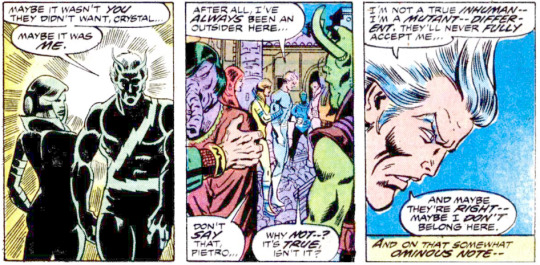
Inhumans (1975) #3
A few issues pass, Pietro and Crystal are held for ransom, Pietro barely talks at all, Black Bolt screams and destroys the Great Refuge- and then randomly and all of a sudden, Crystal and Pietro are placed as regents of New Attilan? But even with this regency, it's clear that the Inhumans don't like Pietro. Crystal thinks that Pietro is "beyond reason" for questioning Black Bolt and the way that the Inhumans interpret his silence as royal edict. When Pietro makes solid points about how Black Bolt doesn't talk so he can't say anything.
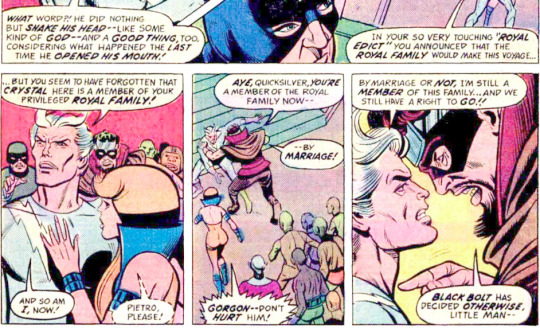
Inhumans (1975) #7
And then in Inhumans (1975) #12, Crystal asks Pietro why he doesn't trust their new leader, and he speaks of the man's lust for power and Crystal goes "well even if his motives suck, he's making progress." She doesn't really take the time to even think through Pietro's point of view, instead meeting him with a "hope you're wrong." Spoiler alert- Pietro was not wrong as we discover in The Fantastic Four (1961) # Annual 12. And even in that issue, where Crystal is telling the FF about how Pietro was right and how valiantly he fought to ensure the safety of the Inhumans against one who only wanted power- she refers to him as "not a true Inhuman," and in the same breath refers to herself as "I, his loyal wife." And in this same issue Pietro even says, echoing Crystal's earlier wording (which he wasn't even around to hear), "I may not be a true Inhuman, but these people are now my family and no one gets away with killing them." He's continuing to position the Inhumans and particularly the Inhuman royal family as his family, while they continue to keep a distance between them, with his wife referring to him as not a true Inhuman, and others making it clear that he is merely tolerated due to his marriage to Crystal.
Crystal isn't completely without merit here though, her words definitely shine light on one part of her thoughts on her husband, but she also shows extreme care for him and prioritizes finding him over the rest of her family when he's captured in The Fantastic Four (1961) # Annual 12. This does however fall into her growing pattern of caring for Pietro more when he's dependent on her than when he's able to make his own choices.
And then, at the end of The Fantastic Four (1961) # Annual 12, we see Crystal grab Johnny Storm's face, look like she's about to kiss him (while giving him "fuck me" eyes), and tell him that she's never going to stop loving him. Pietro sees them, and Johnny is clearly uncomfortable with Crystal's actions (as he has been this entire issue), and he and Pietro make "peace" despite neither of them being the issue here when Pietro basically tells him that he's okay because he's a friend of Crystal's and hopefully a friend of his too.
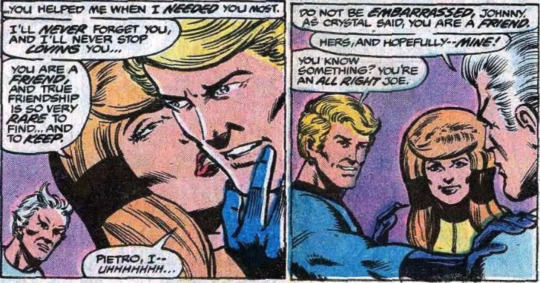
The Fantastic Four (1961) # Annual 12
With the dawn of Korvac Saga, we get further confirmation that Pietro is deeply, deeply committed to Crystal. We start The Avengers (1963) #170 with Pietro gazing over New Attilan in a way that's recognized as sad, and then the following exchange happens:
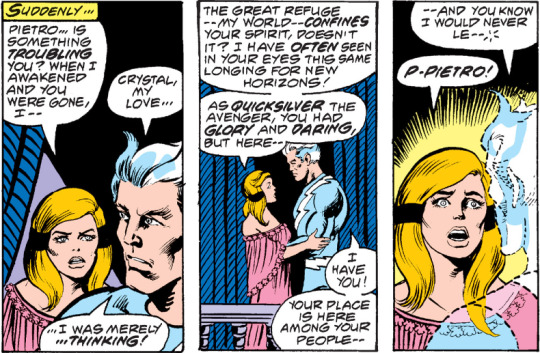
The Avengers (1963) #170
Crystal makes a really great observation about how Pietro's marriage to her has tied him down and changed his life dramatically since his days as an Avenger, but Pietro refutes her concerns saying that what matters to him is that he has her, that he can support her in her place among her people, and is about to say that he'd never leave her when he's teleported elsewhere by agents unknown (at this point in the story at least ;)). This is literally the healthiest their relationship has been to date.
At some point after the Korvac Saga, Pietro rejoins the Avengers, sort of- he's an Avenger again for like a single issue, the whole rejoining thing happens off page, and then come Avengers (1963) #181, he's been kicked off the team and then passes out. In reality we find out that Pietro's soul has been stolen by Django Maximoff who has imprisoned his and Wanda's souls in wooden puppets of themselves. Pietro and Wanda go on a soul-searching journey with Django to discover the truth about their childhoods, learn more about their parentage and then return to Attilan.
It's on Attilan in The Avengers (1963) #188, that Pietro finds out he is going to be a father.
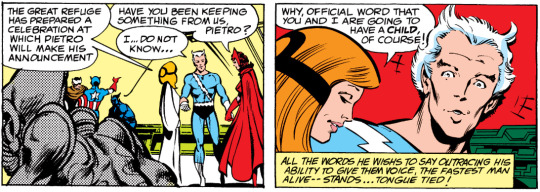
The Avengers (1963) #188
Following the pregnancy announcement, in Marvel Two-in-One (1974) #71, is the first time we see an Inhuman who isn't Crystal be spontaneously kind/nice to Pietro when Gorgon and Karnak invite Pietro to play a game with them. Crystal is also heavily pregnant in this comic so it's safe to assume that some time has passed and that as the pregnancy has continued the Inhumans have warmed some to Pietro's presence among them. With the importance we've seen them place on blood ties and Inhuman genetics in particular, this makes a lot of sense as Pietro is now not just married-in to the family, but is the father of the new member of the royal family.
The next time we see Pietro and Crystal is during Fantastic Four (1961) #239-240, where Pietro has become the sole defender of Attilan in a time of war when all of the Inhumans have come down with a mystery illness. During this time, Pietro continues to be extremely devoted to Crystal and deeply concerned about her health and the safety of their unborn child.
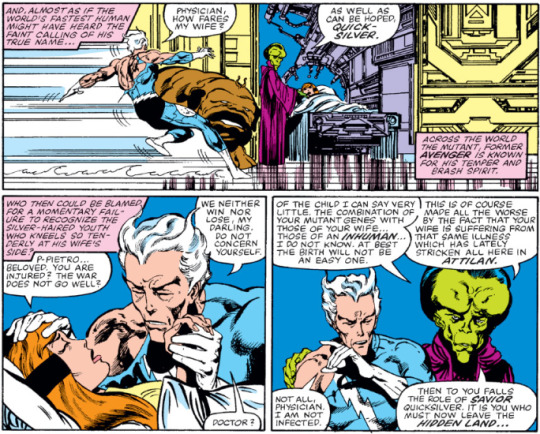
The Fantastic Four (1961) #239
During this great conflict when it seems to be resolved in Fantastic Four (1961) #240, we get another glimpse into the racism in Attilan. The Inhumans freeing those they formerly enslaved is described here as a "mistake," a "failure," and a "noble experiment." The Alphas are still inherently described as being "mindless drones" and as "less-than-human."
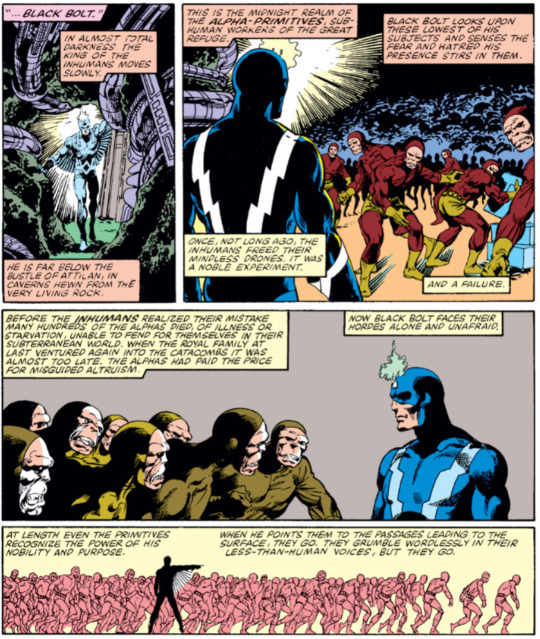
The Fantastic Four (1961) #240
It is into this continued dehumanization of the non-Inhuman on Attilan that Luna Maximoff is born. And Luna, is fundamentally not Inhuman nor Mutant at the time of her birth. But for now, Pietro is just concerned with his wife and daughter's health. He looks like the Grinch, but he's happy and that's what matters.
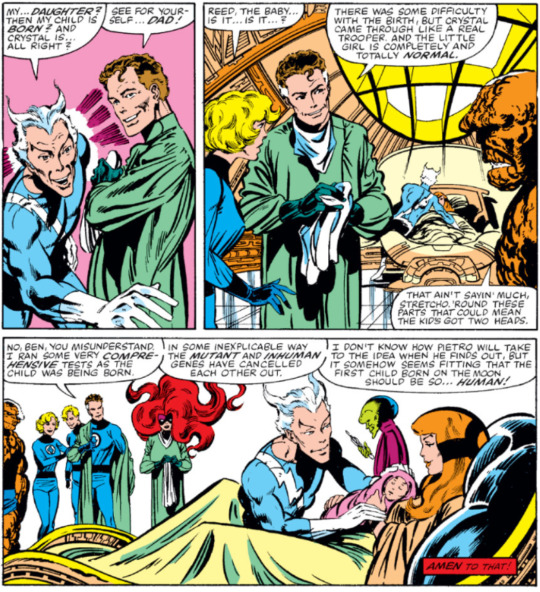
The Fantastic Four (1961) #240
Pietro's bond with Wanda has been repaired and his anger against Vision for existing has dissipated by the events of Vision and the Scarlet Witch (1982) #4, where Pietro encourages Vision to hold his daughter. We get a really great moment of seeing that Crystal and Wanda have started to form a friendship and that Pietro's two families (the one with his sister, and the one with his wife) are becoming closer.
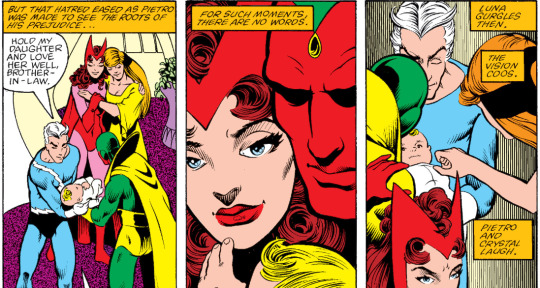
Vision and the Scarlet Witch (1982) #4
But this is where things start to get a little dicey. Magneto, having recently discovered that he is the father of Pietro and Wanda, has now sought them out on Attilan (now moved to the moon) and is determined to try to once again get his children to join his Brotherhood of Evil Mutants (he's not picking up on the message they keep putting down smh). And throughout this fight, Wanda, Pietro, and Erik all make it clear that Erik has severely mistreated his children and that still, knowing he is their father, he is willing to harm and even kill them. Crystal is there- she is witness to this.
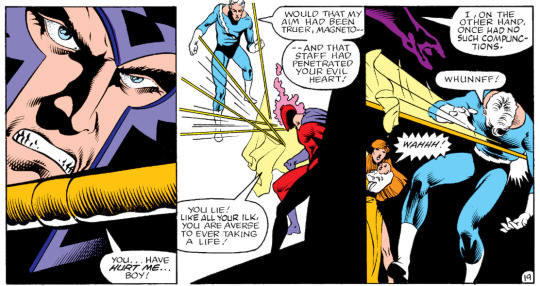
Vision and the Scarlet Witch (1982) #4
And what does Crystal do? But let Magneto hold the baby, before Magneto has even revealed himself to be Pietro's father.
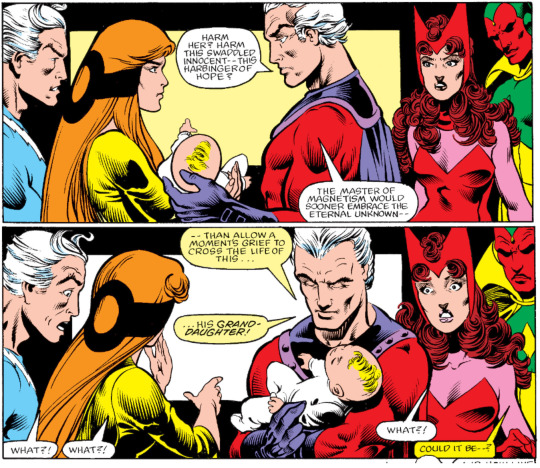
Vision and the Scarlet Witch (1982) #4
Within the pages of Vision and the Scarlet Witch we don't really get to see Pietro's whole reaction to this incredibly traumatizing series of events, but never fear, Wanda recounts more of the story in Avengers (1963) #234 (TW- G slur).
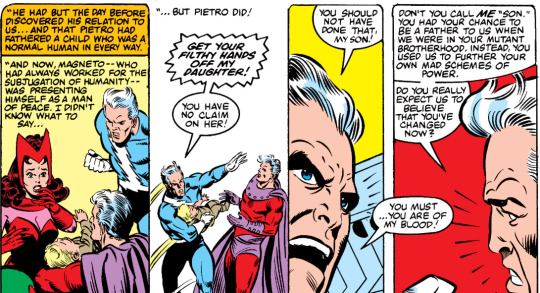
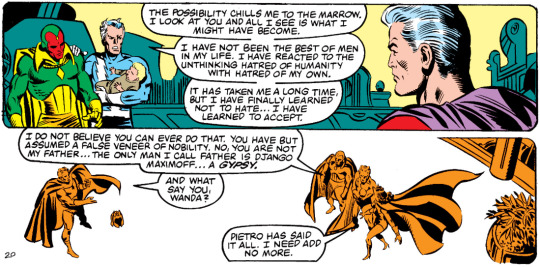
Avengers (1963) #234
Again, all of this is happening in front of Crystal. There is absolutely no way she gets out of this conversation without the knowledge that Pietro and Wanda have been horribly abused by their father and that Pietro is on some level afraid of turning into Magneto and is aware of the temper he shares with the older man and has been actively combating it. It would be reasonable to think that Pietro might need time to process this information.
When we next see Pietro and Crystal it is during a battle on Attilan against the Avengers in Avengers (1963) # Annual 12, inspired by Maximus. Maximus is spared, as always, because Black Bolt loves him too much to actually do anything about the consistent and ever present threat the man poses to the safety and security of their people. (This is a surprise tool that will come back to bite them in the ass). And once again, this issue presents the Alphas as Maximus' allies, continuing to have the formerly enslaved be shown as enemies of the "good" Inhumans.
Pietro and Crystal's relationship goes from bad to worse in The Thing (1983) #3. In this comic, Pietro wishes to partake of his right as an Inhuman father and in the fashion of the Inhumans, his adopted people, expose Luna to the Terrigan mists to spark forth her Inhuman abilities- Crystal does not agree. Crystal brings in Ben Grimm (The Thing) to stop Pietro from following her people's customs in regard to their child, and sends her dog, Lockjaw (who is technically an Inhuman himself but that's never really explored?) to teleport the baby away from Pietro. Crystal's reasoning for not wanting to expose Luna to the mists? She's afraid her daughter will become ugly.
No seriously, that's the reason. Pietro is worried about his daughter's life as one who is both mutant and Inhuman, what her humanity will bring her among her two super-powered peoples. Crystal is worried about her looks. Pietro acquiesces to his wife's wishes following the testimony of their dog/friend(?) and Ben Grimm and is thoroughly painted in the wrong for wanting to raise his daughter as an Inhuman among Inhumans. At least the rest of the royal family was on his side this time?
Anyway, let's remember that Lockjaw is a person and has been a person this whole time and then think back on how Crystal has treated him. Based on Ben and Pietro's reactions to Lockjaw speaking it's also pretty clear that nobody who isn't an Inhuman was aware that Lockjaw was a person and not a dog......anyway....
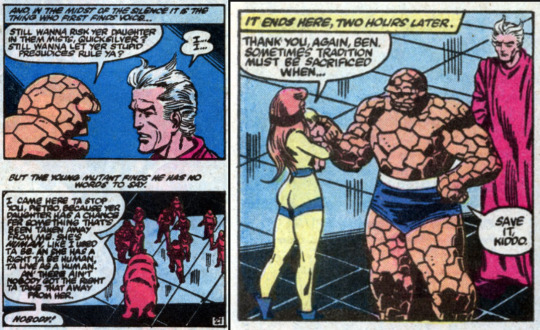
The Thing (1983) #3
We get a completely different idea of Pietro's feelings towards the Inhumans in Marvel Fanfare (1982) #14B than what we've seen previously. In this issue, Pietro is openly critical of the bread and circus approach the Inhumans take with their ruling, and in a shocking turn of events from the last 20+ issues, explicitly says "I'm no Inhuman, and I give no obeisance to Black Bolt...or to your foolish traditions." Pietro is accused of stealing a royal scepter because he made a comment about not being a monarchist (based) and is lured into a trap by someone he thought was his friend who he has had to twice this issue turn down a proposition for sex from.
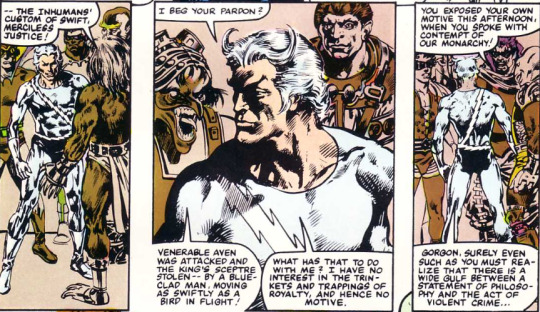
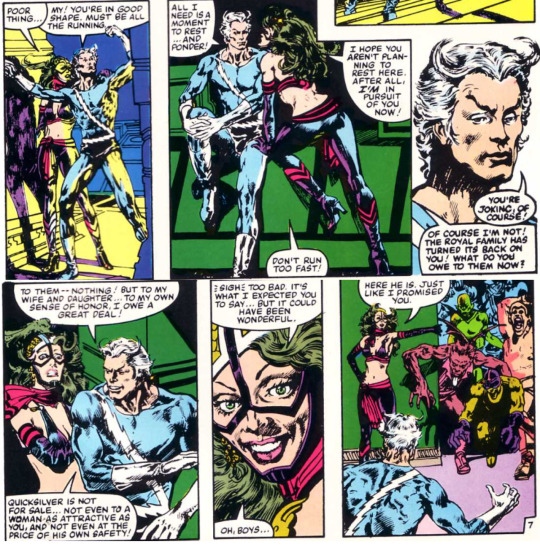
Marvel Fanfare (1982) #14B* *editorial says this issue takes place before Attilan is moved to the moon, however, Luna's birth occurred after the fateful move and she was named for the move which puts the actual chronology of this issue in question, but I'm keeping it here for an easy publication order chronology
We get a clear image, even clearer than it's been in the past that the Inhumans hate Pietro for...not being an Inhuman.
Do we all remember when Crystal literally brought in people who aren't even related to her child to stop Pietro from exposing Luna to the Terrigan mists because she might turn ugly? We all remember this? Okay great- because she's now adopted Pietro's anxieties in Avengers (1963) #243.
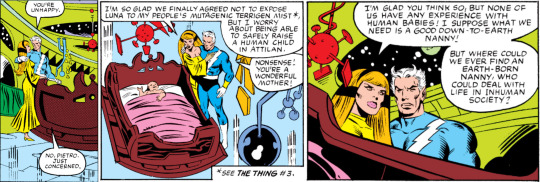
The Avengers (1963) #243
And though Crystal apparently doesn't trust Pietro's parenting choices she's come around to his same anxieties about Luna's human-ness. Pietro tries to support her and then she goes "well none of us have experience with a human baby, what if we just.... didn't deal with that and hired a nanny." And Pietro goes along with it, trying to track down Bova, his minotaur-esque nursemaid from his own childhood who he's only just learned about and has met but once.
We see Crystal and Pietro together again during the wedding of Black Bolt and Medusa, in Fantastic Four (1961) # Annual 18. Where we see Pietro brooding over the wedding festivities. Here we learn that Pietro was given no role in his sister-in-law's wedding and that he is still continuously feeling like an outsider, despite all of the efforts we've seen him take in past appearances to be as much of an Inhuman as possible he is still kept at arms length even by these he considers family. Even Reed Richards (Mr. Fantastic) wonders at the differences between Pietro and Crystal's wedding and the wedding of Black Bolt and Medusa- and Reed wonders if the difference can't be attributed to the fact that Crystal chose to marry someone who was not an Inhuman. And it's a fair question. Pietro even asks Crystal if it's okay that he and their daughter stand beside her during the wedding.
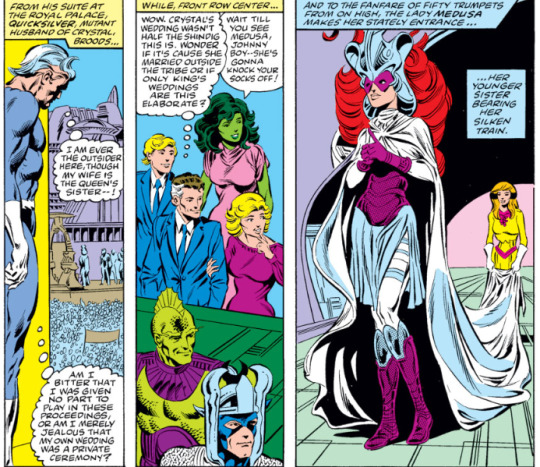
The Fantastic Four (1961) # Annual 18
In Vision and the Scarlet Witch (1985) #5, we see that Pietro has decided to introduce human traditions to the Inhumans with trick or treat, and that he plans to take Luna on her rounds, Crystal along with them of course.
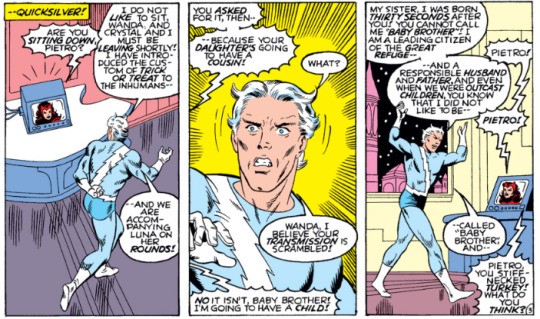
Vision and the Scarlet Witch (1985) #5
Then in Vision and the Scarlet Witch (1985) #6 (that fateful Thanksgiving with the surprise Magneto appearance), we begin to see some strife between husband and wife. According to Crystal, she is "used to being alone." (She is literally a princess in a close-knit family who didn't even stop dating Johnny Storm to start dating her now-husband). And she adds that.
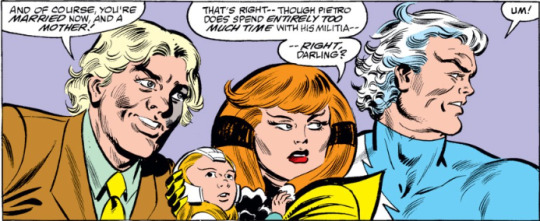
Vision and the Scarlet Witch (1985) #6
The militia, being something Pietro had discussed with Wanda briefly in #5, is a new responsibility of his entrusted to him by the Inhumans. He is now responsible for training a militia intended for the protection of Attilan. It's the first real job he's had since getting with Crystal and the moment he has responsibilities and focuses outside of her, she's not happy. Also yes, Luna does look like a Renaissance baby in this panel.
A month later, in Vision and the Scarlet Witch (1985) #7, we discover that Crystal, who started her relationship with Pietro by cheating on her then-boyfriend, is now cheating on her current husband.
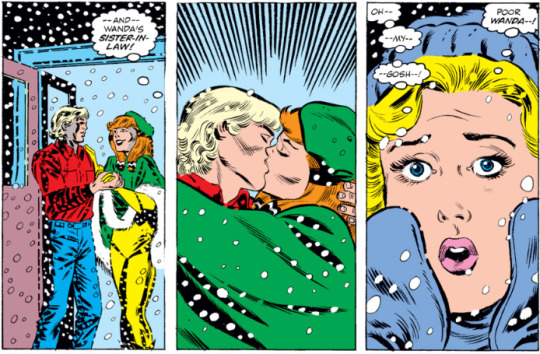
Vision and the Scarlet Witch (1985) #7
Now, I've shown you all the lead-up there is to her cheating. I've covered all of the Pietro and Crystal interactions, and touched base with every major Crystal appearance leading up to this. There isn't any rhyme or reason to this aside from, Pietro has a job and he's doing it. And beyond this, as we move into #8, we learn that Crystal is planning on spending more time on Earth, and from Pietro's perspective it's to spend time with Wanda, but really it's to cheat on him. Once again, the militia (Pietro's job) is very much cited as the reason for this.
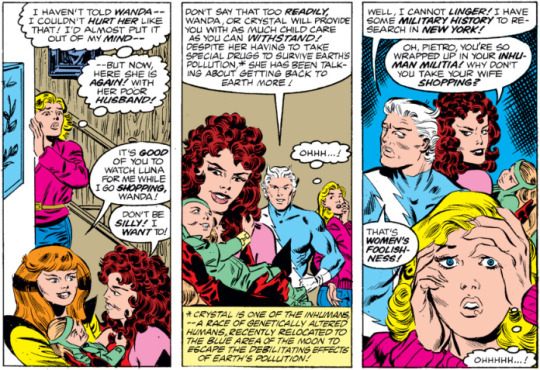
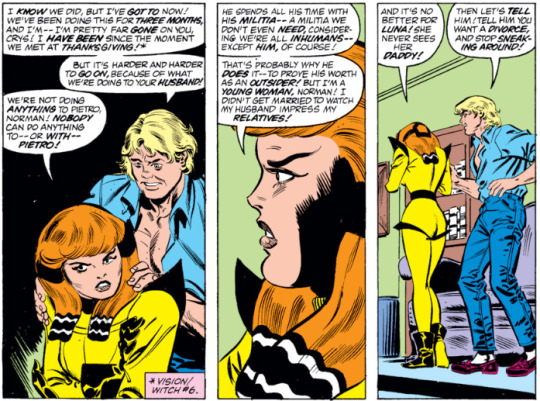
Vision and the Scarlet Witch (1985) #8
While Pietro runs off with Wanda, Vision, and Luke Cage to make sure that Wanda is safe for the duration of her pregnancy (it's a demon thing, Scarlet Witch stuff y'know?), we discover that Crystal is taking this opportunity to cheat on her husband again.
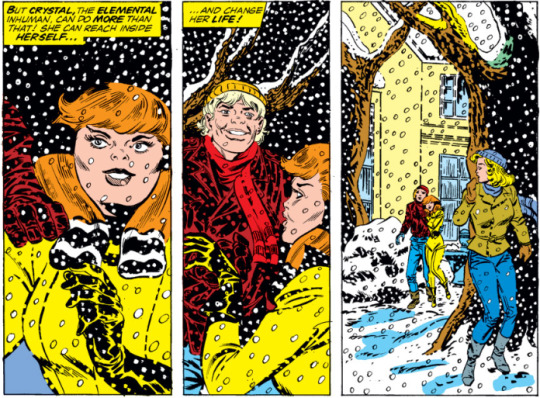
Vision and the Scarlet Witch (1985) #8
Crystal's affair goes on for MONTHS, and even her boyfriend is more worried about what all this is doing to Pietro than she is. She overdoses on anti-pollution potion in order to continue to see her boyfriend, and Pietro spends the vast majority of his time at her bedside frantically trying to get someone to wake her up in deep concern for her wellbeing.
In #10, Crystal calls out her boyfriend's name in her sleep, confessing to the affair, and Pietro tries to kill him. He's stopped by Vision and the Inhumans, and then tries to rally his militia against Norm the real estate agent, the man who has stolen his wife's affections. Wanda confronts Norm and he gives her a sad speech about how Pietro is "neglectful" of his wife's needs and ends it with "I'm not making excuses for deceiving you, but you like your brother better than a lot of people do." Essentially saying "It's okay that she cheated on Pietro, because he's Pietro." Wanda then talks to Crystal's spirit and Crystal says "I cheated on Pietro! I'd do it again!"
Pietro and Vision talk and Pietro comments on how Crystal doesn't allow him to pursue any of his own interests, which tracks with what we've seen that now that Pietro is spending time with the militia she's determined him neglectful and is using it as justification to cheat on him. Throughout all of this too, the Inhumans confirm to Pietro that they think lesser of him because he isn't one of them.
Pietro decides that he can't take Crystal back after this betrayal of his trust (fair and reasonable) to which Crystal calls him a "self-righteous pig" and even Wanda insists that he must take her back because he loves her. And in issue #11, Vision claims that Pietro has "run out on his wife" and Wanda thinks poorly of him for establishing a boundary of not wanting to be around a woman who cheated on him. Meanwhile, Pietro is having a mental breakdown about the fact that nobody actually loves him and that the loyalty he shows to others is not reciprocated.
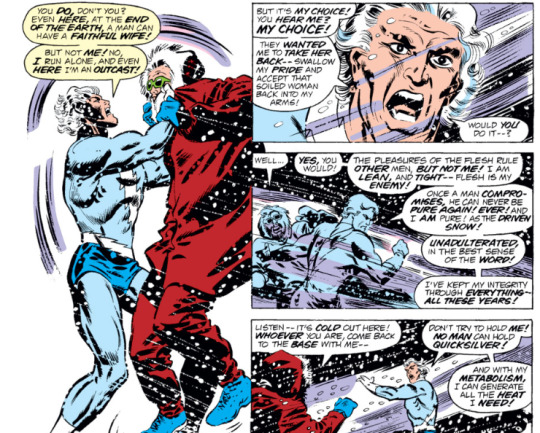
Vision and the Scarlet Witch (1985) #11
And rounding us out in #12, Crystal tells Norm that she wants to keep seeing him and celebrates the fact that if Pietro stays away for a bit longer she'll be granted a divorce.
Here ends part 1 of the meta (stopping close to image limit at a good rest point) and I'll reblog this post with even more commentary at a later date!
Reading List so far:
The Fantastic Four (1961) #131-132 The Avengers (1963) #110 The Incredible Hulk (1968) #175 The Avengers (1963) #127 The Fantastic Four (1961) #150A-B <- Wedding Issue The Fantastic Four (1961) #158-159 The Avengers (1963) #137 Inhumans (1975) #3, 7, 12 The Fantastic Four (1961) # Annual 12 Avengers (1963) #170, 188 The Fantastic Four (1961) #239-240 Vision and the Scarlet Witch (1982) #2, 4 The Avengers (1963) #234, Annual 12 The Thing (1983) #3 Marvel Fanfare (1982) #14B Avengers (1963) #243 The Fantastic Four (1961) # Annual 18 Vision and the Scarlet Witch (1985) #5-12
#pietro maximoff#quicksilver#magnet family#wanda maximoff#scarlet witch#the inhumans#inhumans#crystalia amaquelin#crystal amaquelin#crystal#comic meta
119 notes
·
View notes
Text
Be-All Bonus Feature: Creating the Chapter Photos (part 1)
Happy two-year anniversary to my magnum opus, Be-All And Endor! I can’t believe it’s been that long, and I’m so thankful for all the friends I’ve made in this community through it 💚🧡
Not only that, a couple of weeks ago, it reached 100,000 hits on AO3!!! 🤯
To celebrate these two milestones, I’ve prepared a little treat for the visually inclined among you. So, without further ado, please enjoy some behind-the-scenes examples of how I created the chapter photos.
If I went through all 40, this would end up suuuper long, so I’ve narrowed it down to my top 10. Even so, I still have to split it into two parts because there’s a limit of 30 images per post.

🟢 Chapter 3: The Covenant
Reader’s shiv started as a Google search for knives with wrapped handles. There were numerous “show similar images” searches based on vaguely suitable things I found until I finally came across one I thought would be good. Step 1 was to smooth the blade and remove the serrations and dips. My first attempt, which I can’t believe I actually published when chapter 3 went up, was terrible...
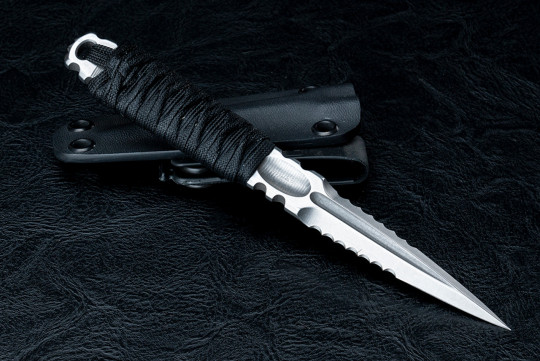

That’s after colour replacement and filters, etc., but I wanted to show you how awful the blade part looked before I revisited it.
When I started thoroughly editing the chapters one by one, I also reworked many of the photos, and this was one of the ones that got a significant overhaul. I started from scratch with the original image, and this time, I smoothed the whole blade but took the ridge you see at the tip all the way along to the handle, making sure I kept the light and shadows going. Much better than the flat grey blade I used to start with.
Next, I used colour replacement (a tool I’d discovered on my first attempt at this) to paint some of the threads on the handle blue.


In the story, Din slides it across Reader’s metal table, but this is obviously on black leather, so I did a load of blurring of the leather pattern and stuck it through some filters. It doesn’t take away the pattern, but compared to the shiny leather in the originally published image above, it could at least now be a pattern in the metal.
Then, finally, I went in close and did a load of detailed tweaking, which involved adding extra blue threads in the handle, making the blue pop more, and giving the overall image a reverse vignette and smoky blur. The result is the first chapter photo in which I felt I’d come close to actually depicting what I’d described in the fic:

It’s an impressive piece, and you’ve seen many shivs throughout your life. Normally custom-made by stripping down larger knives, the weaponsmith will start by removing the guard and much of the hilt’s bulk before installing a slim blade. Then, to complete their handiwork, they’ll securely wrap the handle frame with a sturdy fibre thread for grip and comfort. The result is a dainty yet deadly weapon favoured by smaller-handed assassins and criminals alike. This piece is no exception. The expertly woven cerulean and black threads zigzagging across the hilt are eye-catching additions alone. It was clearly assembled by a weaponsmith with an artistic flair and exquisite taste. You activate the vibration and find it balances perfectly in your grip. Switching it off, you weigh it between your hands, passing it back and forth a few times. As you hold it up to let the light glint off the blade, you notice no flaws across the flat planes. Then you look along the cutting edges, pleased to behold the smooth lines of a perfectly sharpened blade. “Beautiful…” you murmur, hypnotised by its elegance. Mando just sits and watches you examine his gift, a blurry background to your focused study of its nuances. A tiny part of your brain notes the blur moving as he nods in agreement.

🟢 Chapter 6: The Groundwork
By this chapter, I had already figured out how to remove backgrounds and stick Din into other surroundings, but they’d only been silhouettes so far. This was the first time I blended different elements effectively using Photoshop’s layers function, managing to make them look like they belonged together.
I started with Din reclining in Mos Pelgo and then got myself a Shutterstock subscription to get a high-quality photo of a forest through a window.
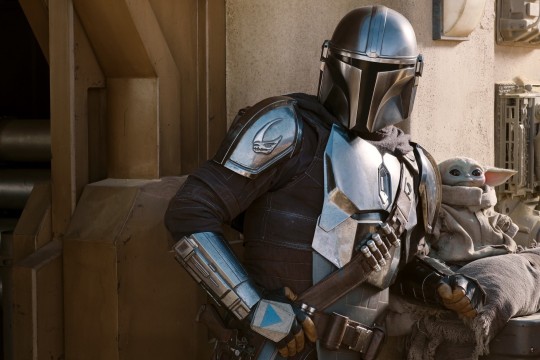

I made several initial attempts to figure out positions and proportions, though none bore any fruit because (a) I needed to get the lighting right and (b) Reader’s quarters are not wood-panelled!
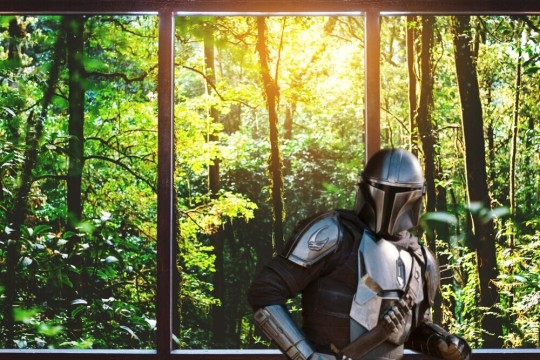
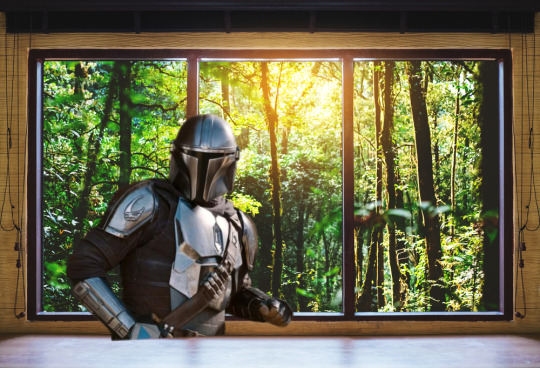
Eventually, I chose the two left panes, photoshopped out the dividing line, and cropped it so you could only see the wall beneath and the frame on either side. I then decolourised the wood and smoothed out the grain until it looked like grey paint.
I initially put it up like that, but when I came to rework it, I colour-matched Din with the background, giving his beskar a slightly golden tint from the rising sun. I then added shadows on the wall beneath his arm where he’s leaning, and I also played with the light and shadows elsewhere.
Ultimately, it turned into something I’m pretty happy with:
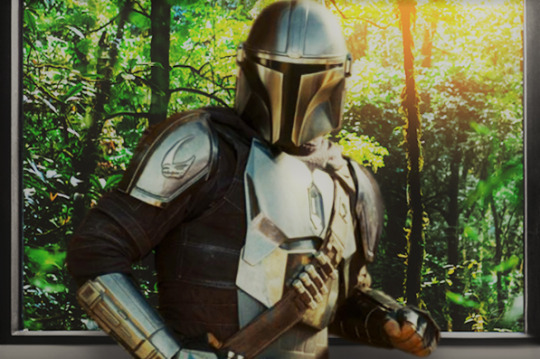
Carefully switching it off, you run through a few manoeuvres for Din, who now reclines against the windowsill with a thumb hooked in his belt. He’s blatantly enjoying the show. The shock baton is about two-thirds the length of your arm, shoulder to wrist, and you easily fall into more of your old drills. Energised, you twirl and wield the metal cylinder as if it were a short sword, parrying imaginary blows with gusto. You even throw in some flashier moves just for fun. Given the lack of space, your final step brings you directly in front of the hunter, and you twist and swing the weapon at his helmet. It’s an obvious action, and you slow it down on purpose, but you’re curious to see whether he blocks you. Surprisingly, he doesn’t, and you arrest the baton’s movement a second before it impacts the beskar, hovering in place. Kriff, he didn’t even flinch! Your eyes lock onto the black T of his visor, and you catch your lip between your teeth again, waiting for his reaction. You get the feeling he was testing your control as much as you were his trust. You both passed, right? Points to both of you.

🟢 Chapter 9: The Hide
This one had a lot of different elements and took a while to get right.
I started with a Shutterstock photo of a giant redwood and (shoddily) Photoshopped out the tourist. Then, I located a promising-looking photo of a survival shelter built from branches, and again, I went wild in Photoshop to erase the elements I didn’t want.


Thrown together, they still needed extensive blending and adjustment. First, I used the patch tool to fill the gaps in the tree and shelter. Next, I found some forest undergrowth in another photo and extracted it into a third layer to place in front. Lastly, I played with light, tone, and colour until I had something I was initially pretty proud of.
The originally published image is the second one below.


When I came to do the edits, though, I added wisties (bioluminescent insect-sized creatures on Endor) in the narrative, so I also added them in the photo. Plus, I fixed the poor Photoshopping job where the tourist used to be. I also realised that the sun was about to set in the story, so the original image was far too light. Incorporating the wisties allowed me to darken the background and light it slightly differently.
What I ended up with is something I’m now delighted with:
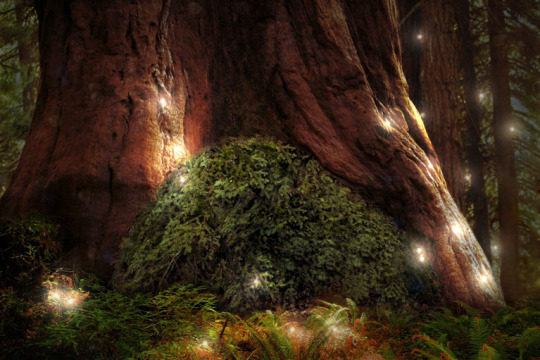
After agreeing to each observe one side of the trail for signs of a hide, progress is slow for the next ten minutes or so. Finally, Din draws your attention to the right, and you bring the bike to a stop as he indicates a particular area of undergrowth. For a second, you think he’s just pointing out the bioluminescent insects flitting through the foliage… until you focus beyond them. A construction similar to what you described earlier juts out from the base of a giant redwood several metres off the main path. It’s well-disguised and covered by living vines, and if you hadn’t known what to look for, you wouldn’t have spotted it. “Good timing, the light’s almost gone.” The relief in your statement is palpable, and your hunting partner echoes it with a grunt as you both dismount. He then pushes the bike through the foliage, concealing it from view behind the colossal tree. As he stashes the speeder, you examine the hide. The glowing insects depart en masse as you gently agitate the leaves and vines to identify the entrance, and you eventually locate it on the right side near the trunk. Lifting aside the woven branch panel concealing it, you crouch down to get a better look inside. Yup, cramped as expected. It’s built for Ewoks and barely exceeds a metre in height at the half-dome’s apex. But as you shuffle into the gloomy interior, you’re pleased to find just enough space for you and your broad-shouldered warrior to rest here for the night.

🟢 Chapter 10: The Beast
Now that I’d figured out how to effectively blend layers, my next challenges were (a) how to include a CG image as one of those layers without it looking obviously out of place and (b) how to effectively light a nighttime scene.
I started with the CG image of the gurreck from Wookieepedia and what I thought was a good forest photo. However, I quickly realised I needed something with more appropriate lighting since this chapter takes place at night.
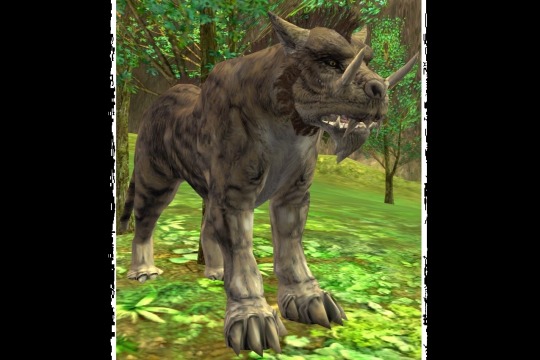
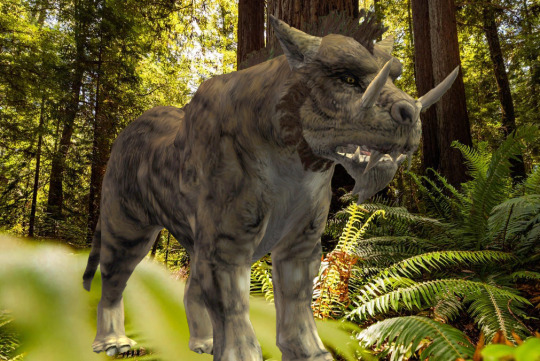
Fortunately, I found a far better background. After some jiggery-pokery, I managed to isolate some of the foreground foliage into an extra layer, allowing me to insert the gurreck behind it.
Next, I had to make it properly nighttime, so I added a foreground layer of midnight blue and used the ‘darken’ blend option. This tinted the whole image but kept the hazy feel.

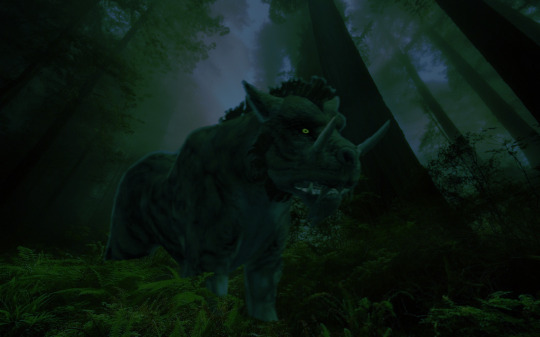
Then I needed to add the Darksaber, so I pulled that from Din’s duel with Paz, flipped it upside down, and added it as yet another layer. The trouble was, having been cut out, most of its glow had gone with the background, so I needed to learn how to put that back in after the fact.
There followed viewings of YouTube videos on how to make things glow in Photoshop, and I gained a new skill!
I also had to horizontally flip everything because, in the story, Din approaches the gurreck from the left and draws it right.
When I later edited it, I worked even harder on the lighting to ensure that the light and shadows on the gurreck and surrounding foliage originated from the appropriate sources, i.e. the small amount coming from the planet above and the glow cast by the Darksaber.
Although the end result is extremely dark and probably doesn’t show up that well on devices with the brightness turned down, I’m actually really happy with the cumulative result:
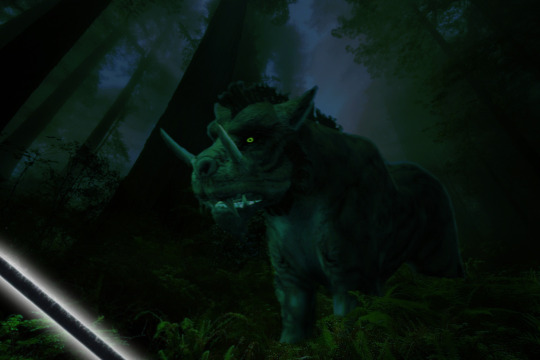
He grunts his accord, then begins to weave to the right, stepping in front of the hide. As agreed, you stay motionless by the side of the giant tree. His steps are loud and determined, trying to draw the creature’s focus. It works. You can just make out the massive black shadow drifting back to the right, its attention caught by the closer target now backlit by the faint glow from your shelter. A full-bodied and menacing roar reverberates from the gurreck’s throat and licks at your nerves. You recognise it as its final attempt to scare its intended meal into a chase. And your partner knows it too. You hear a soft beep as he touches his vambrace to deactivate his helmet tech, and then there’s a strange, low whine. And, holy shit… he’s ignited a weapon unlike anything you’ve seen before! It’s… crackling white energy surrounding a fearsome black blade, almost a void in the universe. A beautiful sort of deadly. But adrenaline focuses you, and you manage to avoid gawking, taking your cue and activating the vibroblade at the end of your lyaer’tsa. The beast lunges forward, its target made more visible by the weapon’s glow, and you move at the same moment. Rushing out and around to approach it from the side, you take determined steps to avoid tripping on the thick foliage.

🟢 Chapter 12: The Storm
As explained in my chapter notes, writing this chapter involved extensive research, and I discovered that quartzite is a very safe type of rock to shelter under from a lightning storm. As I was writing, I started looking for photos of quartzite to help me better describe it, and I eventually found the perfect one (thanks, expensive Shutterstock subscription!).
When creating this chapter photo, I had to liberally utilise Photoshop’s editing tools, as I needed to smooth out numerous elements in the original image.
First, I flipped it because, in the story, I describe the flat rock Din eventually leans his back against being on Reader’s left when she’s crouched under the slope as he pulls the blanket across in front of her.
Then, I smoothed out the rocks and made the ground flat.


Next, I needed Din in the foreground, contemplating the outcropping’s suitability as a shelter, so I found a nice HD version of the lovely pic where he’s meeting the massiffs, did the ol’ background removal thang, and popped him in place.
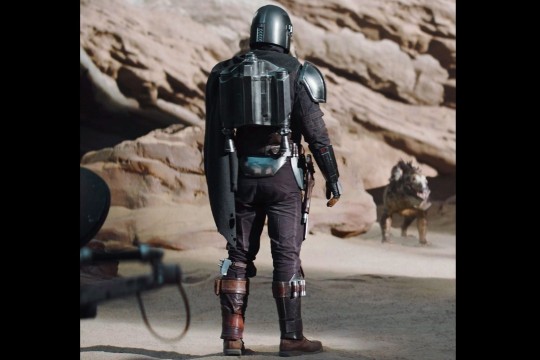
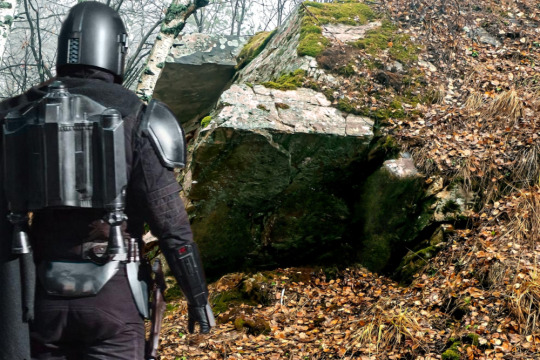
But it was all too bright and cheerful. Din and Reader are looking for a place to shelter in the middle of a terrible storm.
After adjusting the lighting, tone, levels, saturation, and colour-matching Din to the background, I was happier, but I still needed rain.
I watched some YouTube videos to find out how to add rain and made a few attempts that came out decent enough... but then I stumbled across a site that would add animated rain! I love how it turned out:

It’s a further ten minutes of pressing through thick foliage and flinching at the cracks of thunder, and your nerves are getting frazzled. But soon, the space between the trees increases, and the vegetation begins to thin out, making you feel less trapped. As tangled roots make way for a slippery carpet of leaves, your companion leads you to the base of a steep ridge. Several sharp rocks and boulders protrude from it at odd angles, and a few almost overhang, creating shallow yet vital sources of possible shelter. However, the ground below them is a quagmire of mud and leaves, and you’re not keen to sit in it. He soon finds a suitable location: a shallow outcropping at a right angle with a vertical face, forming a corner alcove. The planes of the rock are oddly smooth and look almost carved. “Stay back; gonna use my flamethrowers,” he warns. Once you’re crouched a few metres away, grasping the backpack he just shoved into your arms, you discover the purpose of his pyrotechnics. He angles both vambraces at the spot beneath the rocky overhang, and twin jets of fire incinerate the damp leaves, baking the mud into a hardened seal. Smoke billows off the ground as the rain cools the superheated earth, and when he’s deemed it safe, he beckons you closer. There isn’t room for both of you under the jutting rock. In fact, there’s barely space for you on your own without a broad man in beskar. Plus, it doesn’t protrude far enough to keep either of you completely dry. But Din seems to have a plan, and you value his survival skills even more. “Crouch down there and give me your cloak. I need your vibro-shiv too,” he instructs, speaking directly toward your ear. The sky flashes bright with lightning again, making you close your eyes against the reflection in his armour. Between peals of thunder, he urges, “Now.” You duck under the low, shallow overhang and follow the instructions as fast as possible. Squatting on the baked clay-like spot, you bemoan the loss of your waterproof covering until you realise what he’s doing with it. He jams his vibroblade through the blanket’s corner into a fissure just above you, then pulls it across and secures the other corner using your vibro-shiv. It’s low enough to connect to the ground with plenty of excess, and from inside your narrow refuge, you watch him pull it outward a little. Then the fabric goes taut, and you surmise he’s heaved some smaller boulders onto the lower edge to prevent it from whipping about in the wind. You’re now veiled from the elements by a vertical stone wall on your left, plus an inclined rock roof/wall behind and above you. The waterproof blanket creates a mirrored sloping fabric roof/wall at a narrow angle from the lip of the outcropping to the ground in front. A small opening remains at the end for lookout purposes, downwind so the gusts won’t blow inside. Using only two blades and a blanket, he’s constructed a tiny mixed material cave-tent. And he’s done it with such nonchalance – as if keeping you both safe and dry amidst a monster storm isn’t an outstanding display of skill.
Be-All Bonus Feature: Creating the Chapter Photos (part 2) →
#be all and endor#fic anniversary#behind the scenes#star wars#the mandalorian#din djarin#mando#the mandalorian x reader#the mandalorian x you#din djarin x reader#din djarin x you#mando x reader#mando x you#star wars fanfiction#the mandalorian fanfiction#din djarin fanfiction#mando fanfiction#pedro pascal#pedro pascal characters#pedro pascal character fanfiction#mandalorian#the mandolarian#the mandolorian
25 notes
·
View notes
Text
A Tik-Tok Trend. Part 2 (Final)
Be careful, there may and will be errors, as English is not my native language!
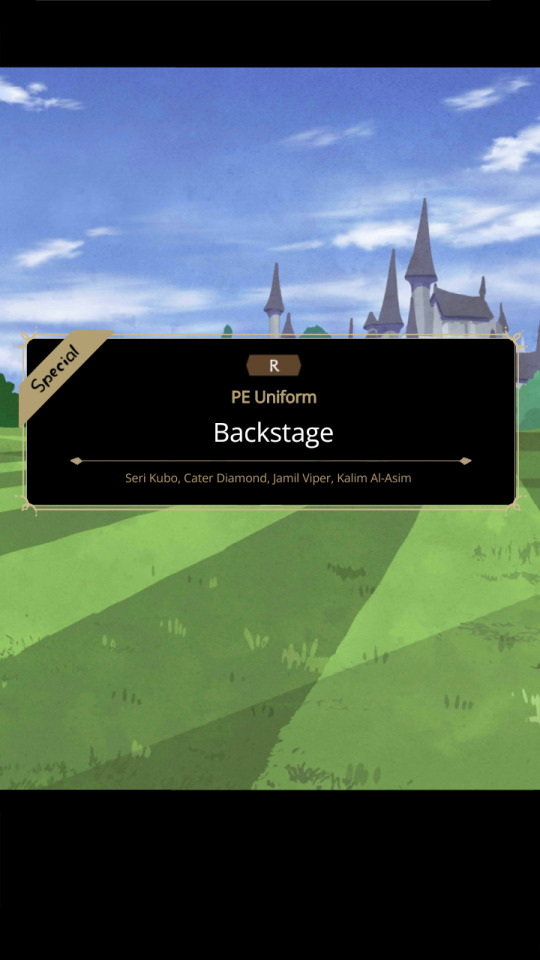
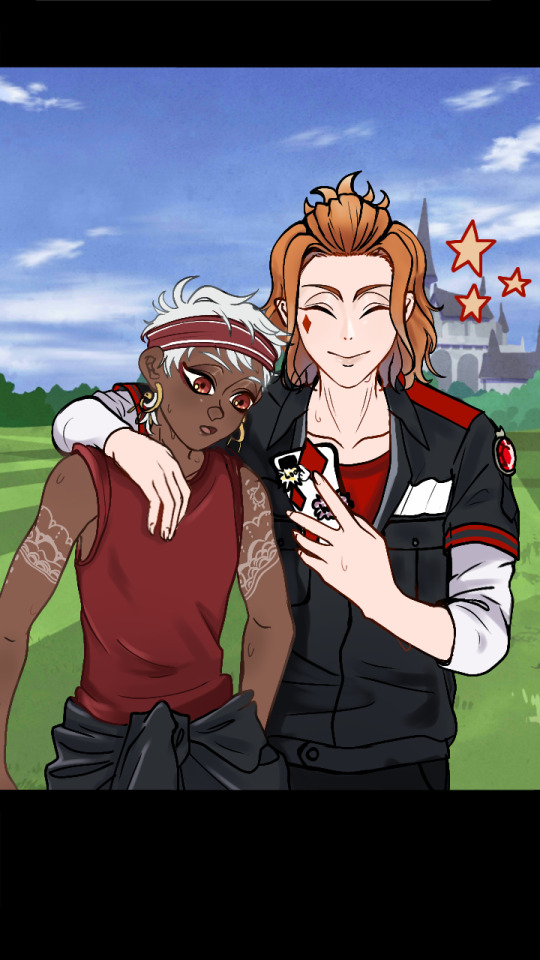
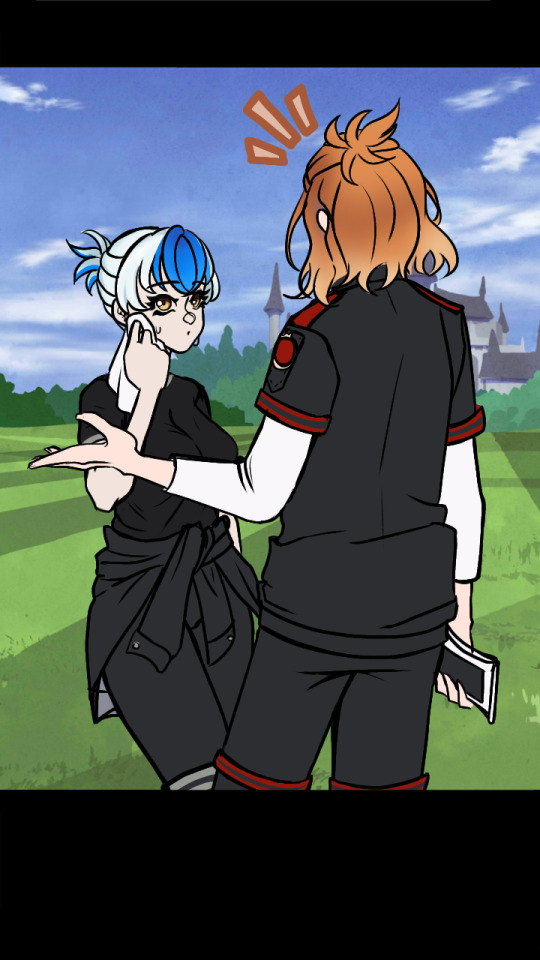
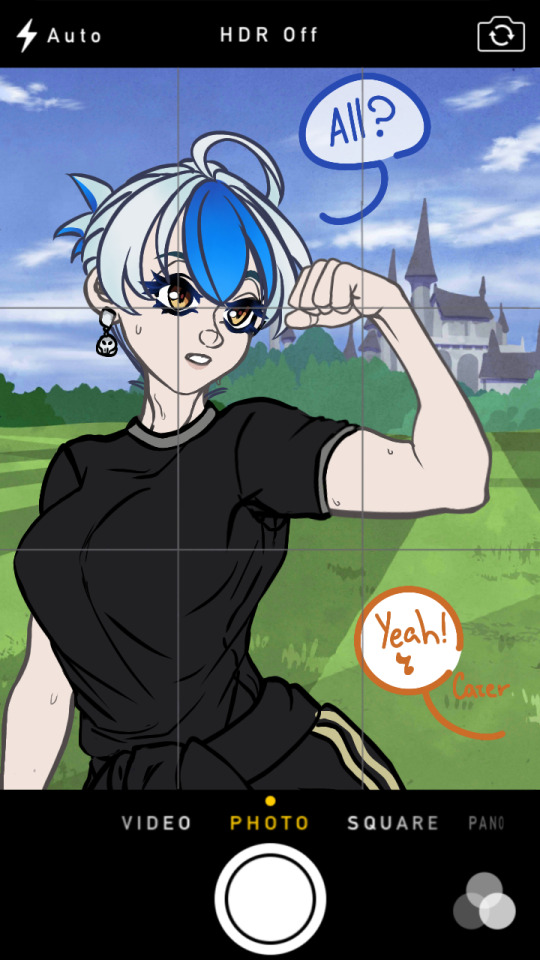
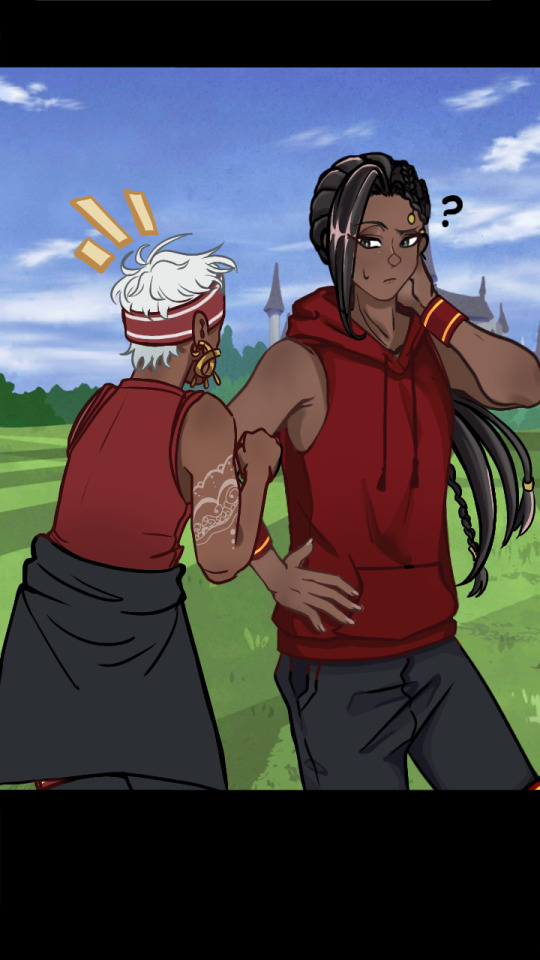
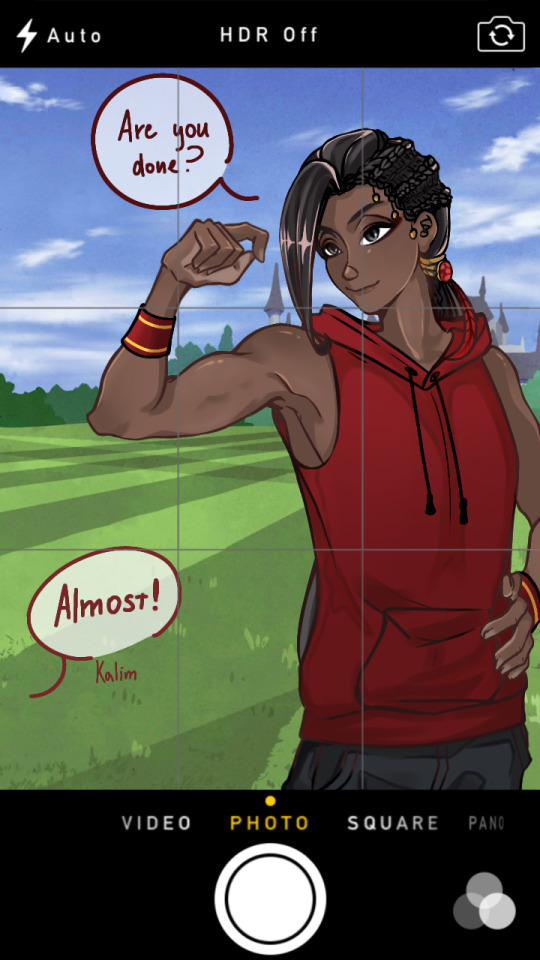
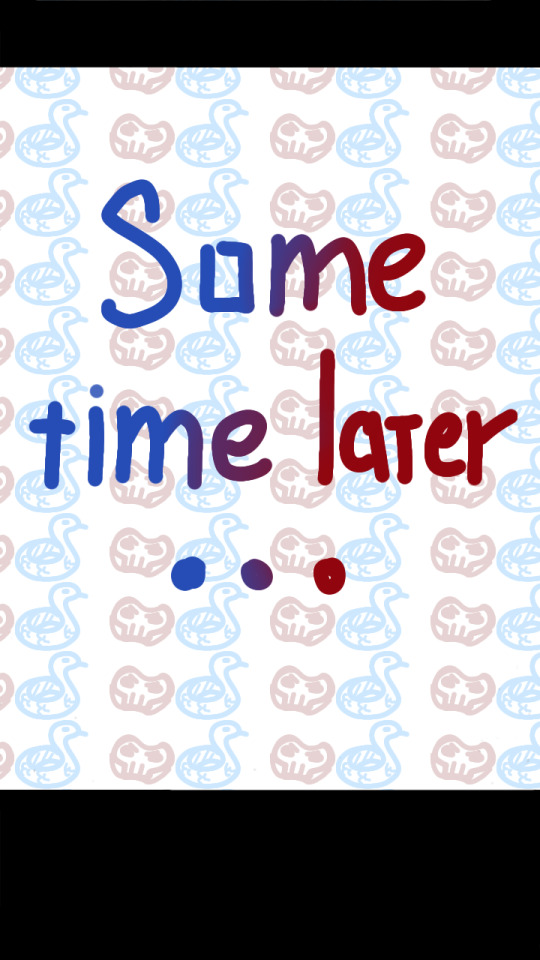
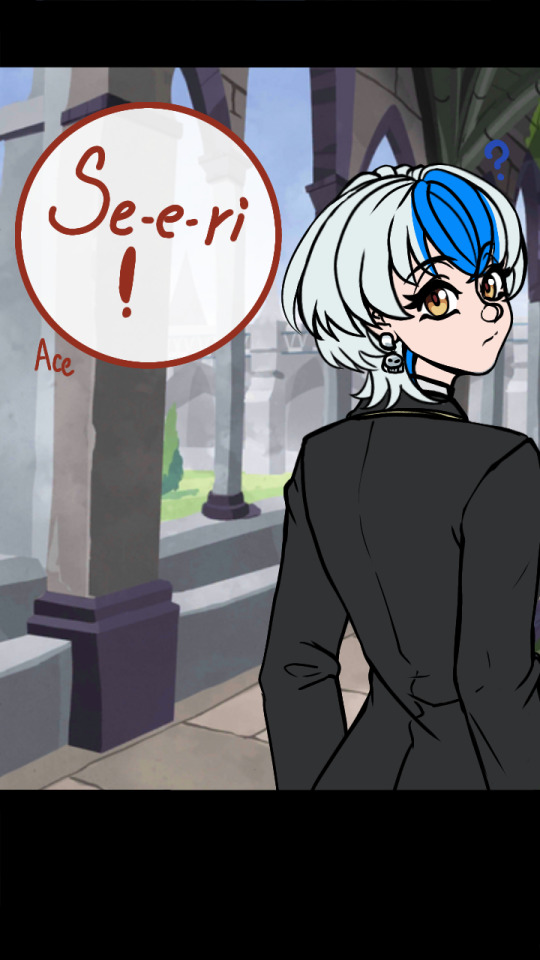
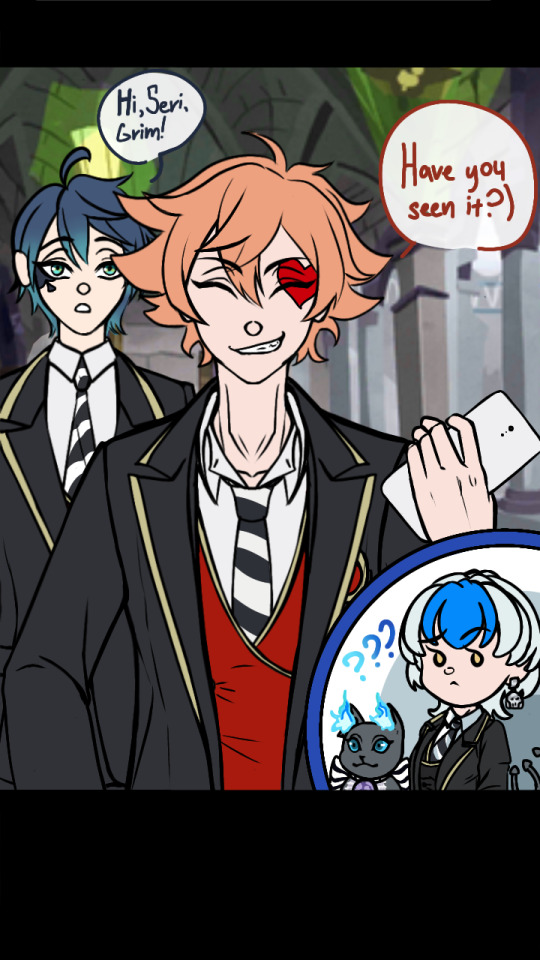
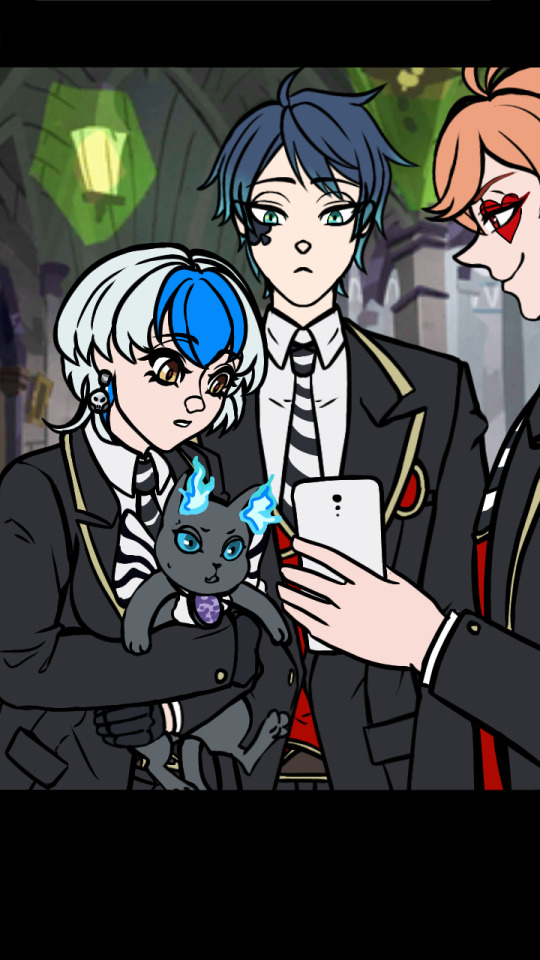
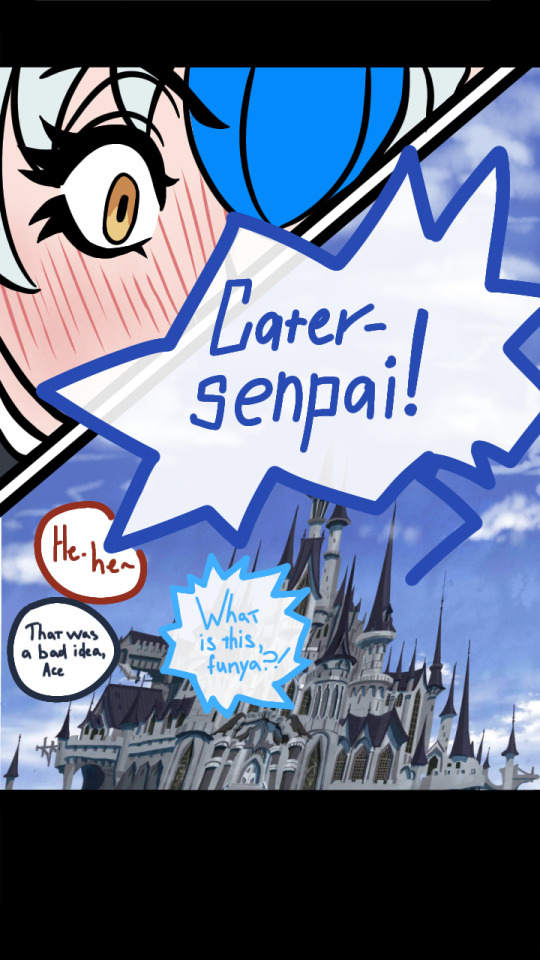
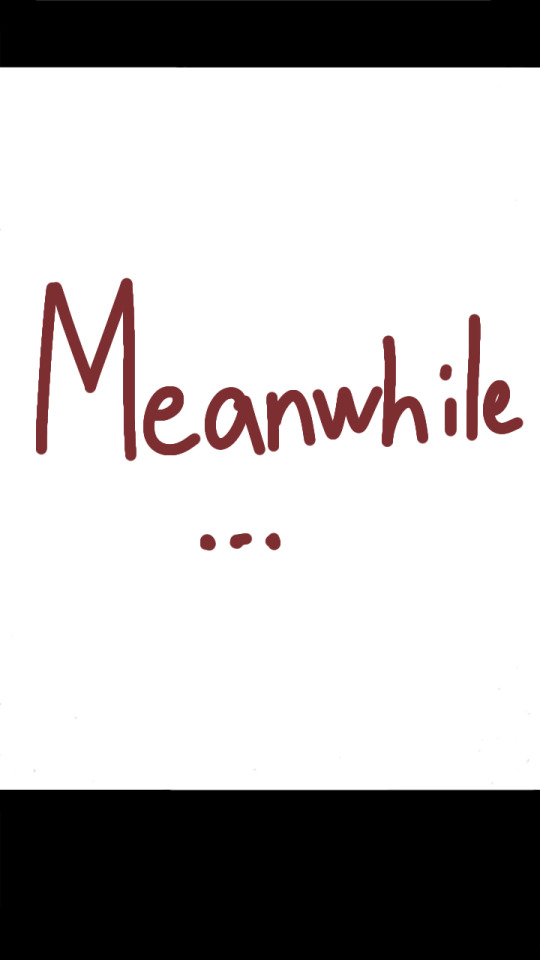
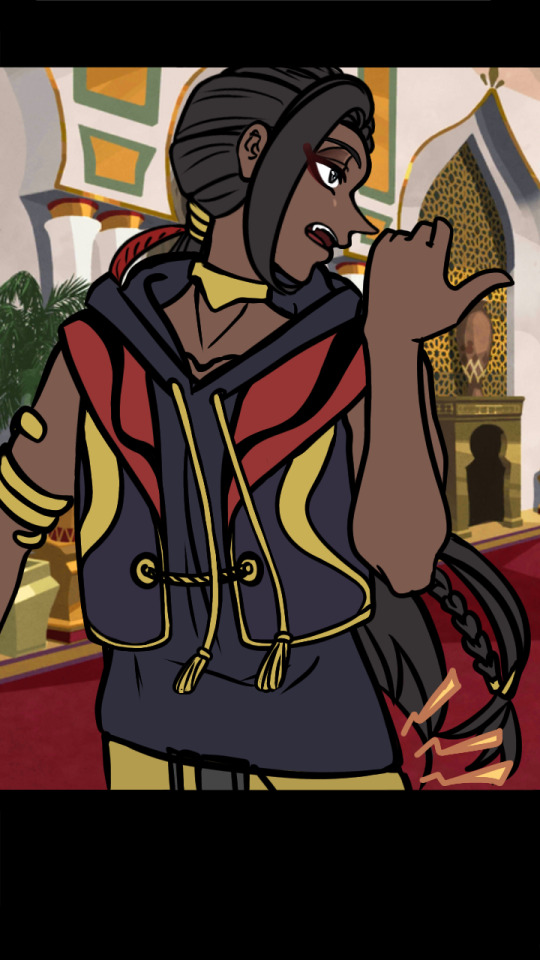
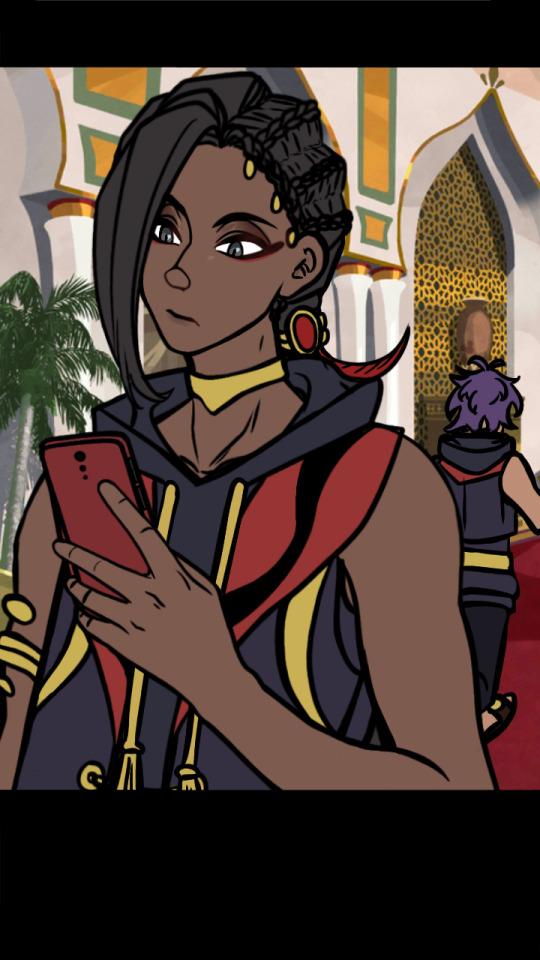
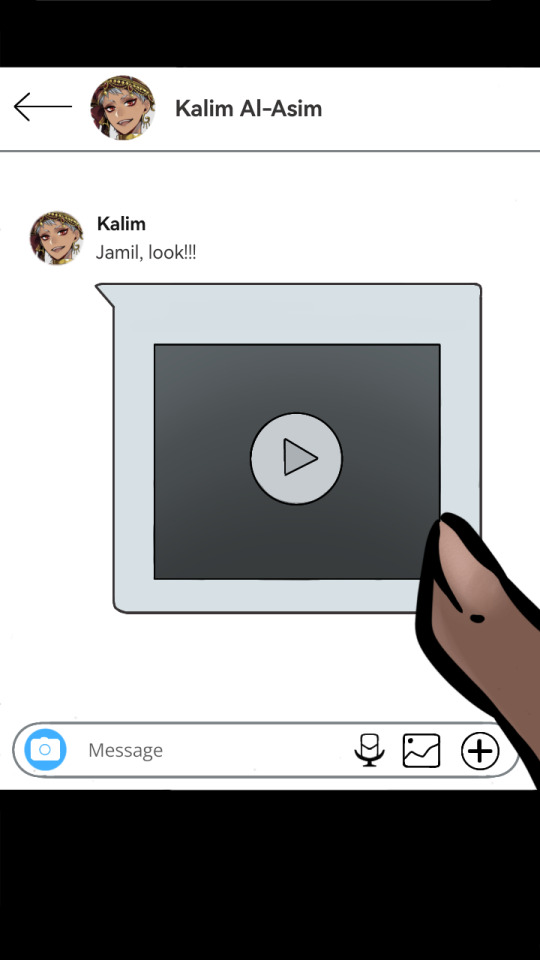
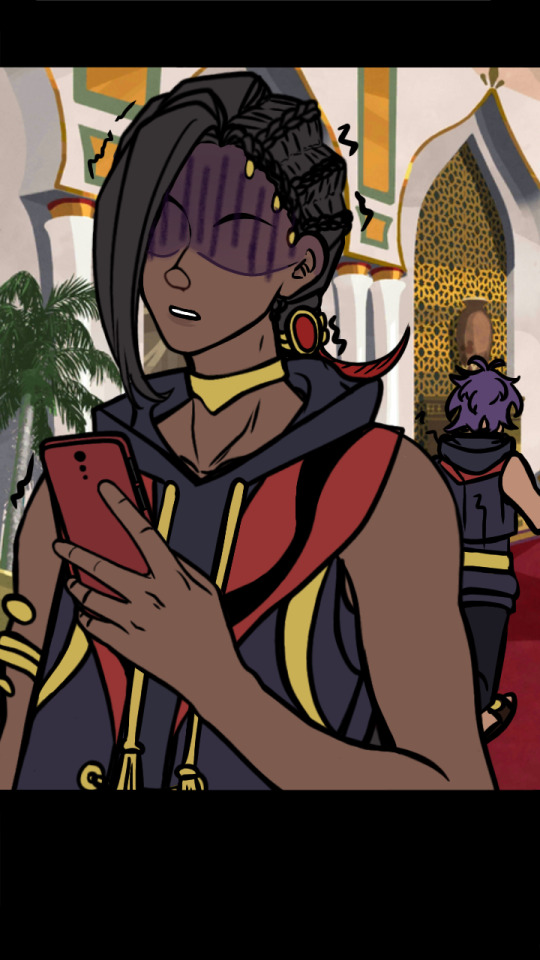
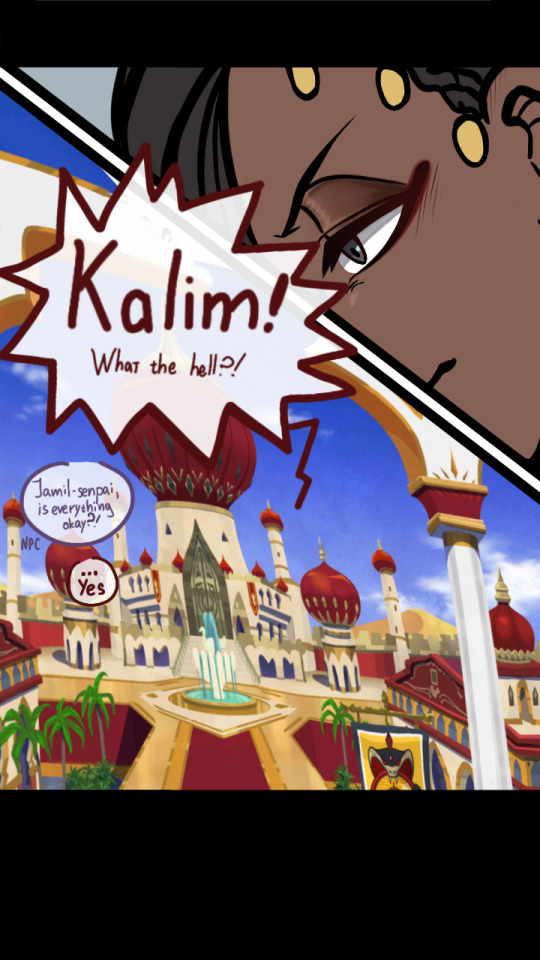
When you just wanted to quickly follow a trend but ended up indulging in a mini-skit that got rethought two or three times because the characters’ motivations didn’t entirely make sense.
To be fair, they still don’t entirely make sense, but hey, I drew this on a wave of emotions and just wanted to join in on the trend. But—damn my brain—it insists on overcomplicating everything.
Therefore, after a bit of analysis, I realized that there was no way this could work without the intervention of third parties and a clever little plan.
Given Jamil’s personality, he definitely wouldn’t agree to such a trend without solid reasons, especially if the suggestion came from unfamiliar people. And Seri, being someone who figuratively “lived in a cave” and barely uses her phone due to how busy she is, wouldn’t have any clue about these trends either. So, she wouldn’t have suggested it herself. (And neither would Jamil, who is already short a couple of hours in his schedule and wouldn’t waste the time he does have on these trends.)
If the suggestion came from Kalim, Jamil would have had a 60-80% chance of agreeing to it. But let’s just say the suggestion was a simple request to “take a photo” without much explanation.
Originally, it was supposed to be Ace who sent the video, but at that point, my brain suddenly questioned why Cater would post something on his MagiCam that wasn’t related to him at all. So I replaced Ace with Kalim, for whom Cater edited the video featuring Seri and Jamil just for fun. Ace caught Cater in the process and managed to convince him to send the video to him so he could tease Seri. This time, it worked.
In the end, this trend became a task for the Music Club: to see how many people they could convince to take part in the trend.
Drumroll! Who was the winner of the music club competition? Of course…
Of course, friendship won! The trend spread so well that they lost track of the score. Though Cater came very close to winning, yeah... Lilia tried his best, but... the students all suddenly became way too shy.
After this, Jamil started scrutinizing Kalim’s requests even more carefully, even if they seemed ridiculously simple. Not that he didn’t already, but somehow, he’s even more cautious now.
(And no one will ever know that an embarrassing video is secretly saved in a private folder, somewhere no one will ever find it. Someone has also added new drawings to their collection.)
And with that, this little story comes to an end.
Although... this could be expanded into a vignette about Seri in her PE uniform, hmm. I’m not sure—this will probably never see the light of day.
The art style is slightly different from what you saw in the previous post because I was drawing it on the very last remnants of inspiration.
#vian#seri kubo#jaeri#semil#sketch#oc sketch#didgital art#didgital painting#drawing#disney twisted wonderland#disney twst#twisted wonderland#twst wonderland#twst#twst oc#twst yuu#twst prefect#yuusona#yuu twst#yuu twisted wonderland#jamil viper#twst jamil#twisted wonderland jamil#oc x canon#oc x character#jamil viper x oc#jamil viper x yuu
31 notes
·
View notes
Text
TWST Family Lore: Heartslabyul Part 1
As a fanfic writer, the family question has been coming up a lot for me with these guys, especially with me wanting to potentially actually write these unseen family members that get mentions thrown out there, so I started collecting information, and then, I thought I'd make a post about it! This first part is just Heartslabyul, about their family members and what we know about them (that I could find, anyways), plus some of my thoughts/guesses. This very well might not be exhaustive, but maybe if I see something more I'll add on!
That said! Spoiler warning! I am including info from various vignettes, card voicelines, and events, including JP server only cards, but I will try to avoid too many specific JP event story spoilers (which in this post is pretty much just a lot of White Rabbit). I include main story stuff from book 1 and also the first part of book 7 (which is out in EN), but nothing from the rest of book 7 which is out in JP. Which probably doesn't have anything Hearts-related anyways (I do not know)? I might be waiting for the rest of book 7 to come out before posting a Diasomnia edition to this, though...
So anyways! Let's get to it!
ACE TRAPPOLA
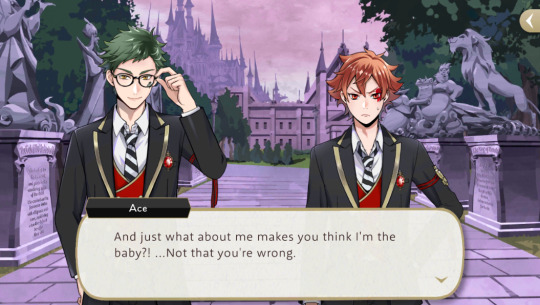
He has an older brother (seven years older than him, as mentioned in his school uniform vignette), whom he seems to be fairly close with. We also have mention of his dad, but so far, as far as I can tell, there is mention of no one else. He does mention his parents in the plural once: in his ceremonial robes voicelines, he says that "I think my brother was happier than my parents when we found out I made it into this school." We also know that his brother was a student at NRC himself and was also in Heartslabyul, which may very well be one reason for his enthusiasm at his little brother getting into the same school. At the freshmen orientation ceremony, Ace shows no surprise to getting chosen for Heartslabyul, assuming that he'd end up in the same place as his brother (Ace robes vignette).
But first, Ace's dad! He gets mentioned in his birthday boy vignette. He is not a mage (implying that, perhaps, Ace and his brother get their magic from their mom's side? As it does appear to be a genetic thing of some sort according to some mentions, but also, it can skip generations, as is seen with Epel), but he is really good at old-fashioned magic of the sleight-of-hand variety. When asked what got Ace into sleight of hand by Yuu for the birthday interview, he says it'd be his dad, who was "ridiculously good" at it.
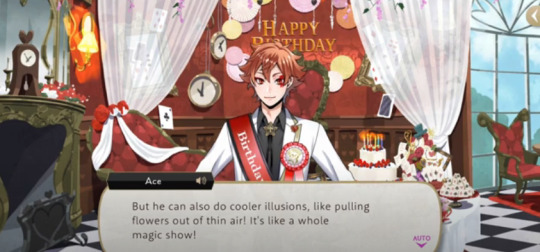
(image credit: Songstress Studios)
Ace goes on to say that he learned the "nuts and bolts" of it from his brother, whom he believes was also inspired by their dad, and he also says that whenever he visits home, he and his brother will show off to each other and challenge each other to spot the trick!
Ace also talks about his brother in relation to learning tricks in his dorm uniform vignette. He shows sleight of hand tricks to his dormmates, and when Riddle shows surprise and awe over the 'pick a card' trick he's definitely never seen before, Ace says that he reacted in pretty much the same way when his brother first showed it to him. When asked about his brother, Ace says that he "started playing around with cards for funsies" while he was a student, and Ace later learned from him, but not directly. He never gave away the secret, but Ace learned by watching him. (And he learned well, too! Ace has been shown to be very good at this, also coming up notably in the Fairy Gala IF event, for instance).
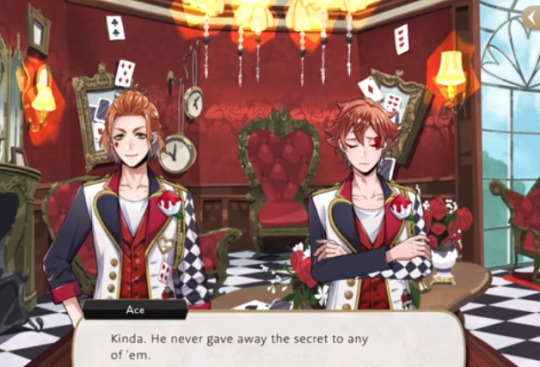
(image credit: RedAngel)
Earlier, Cater had asked Ace to show him the secret, and Ace made a deal with him for it since he'd never do it for free, and after hearing Ace's story, Cater guesses that Ace's mentality of never giving away anything for free could have come from his brother.
It also seems that Ace's brother was absolutely the type to tease him. In his birthday boy vignette, Ace tells a story of how on his birthday, his brother gave him a box with a fancy watch inside, which got Ace all excited, but then he clarifies that the watch was *his* watch, not Ace's. Ace's gift was the box. His brother afterwards fills the box with candy, but Ace was not amused.
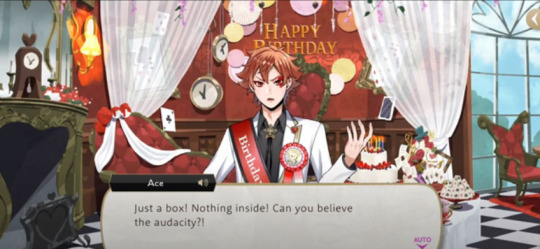
And in other notes:
He is bad at cooking, according to Ace, who says he "doesn't know a cake from a steak" (school uniform vignette).
He taught Ace how to "kill time in the dorms" (school uniform vignette).
He took a theme park management internship in his fourth year at NRC, and he's continued to work there after graduation (Book 7, Chapter 4).
(Also, this thing about the theme park might be a reference, maybe?? In the Tokyo DisneySea park, there was this "villain recruiters" show that ran from 2015 to 2018, featuring original minions of various Disney villains who would make a pitch to invite guests to join the "Villains' World," and there was a Queen of Hearts card soldier character named Jack Heart, whose costume design does resemble Heartslabyul's! And he does the heart thing with his hands like Ace does in his official art! So, might have been inspiration? Anyways, this tumblr post by ceeyuin666 has a nice summary of it so there).
Anyhow, back on track and back to the school uniform vignette, Ace mentions how before he came to NRC, his brother would "take him about everywhere," which does seem to imply they spent a lot of time together, and he also seems to have been a big influence on Ace. For better or worse :). In this vignette, Ace does a favor for Trey in exchange for a slice of cherry tart, when tips for the history test were what he really wanted, a second motive Trey totally expected, and when asked if he was lying about loving cherries so much, Ace said that he wasn't: his brother told him "the most convincing lies are sprinkled with a dash of truth." Knowing Ace, Trey is not surprised.
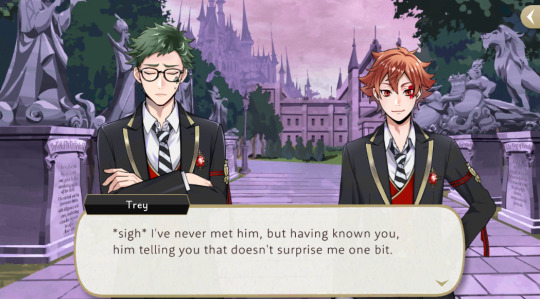
(anyways I really want to meet this guy so please Ace hometown event please!!)
DEUCE SPADE
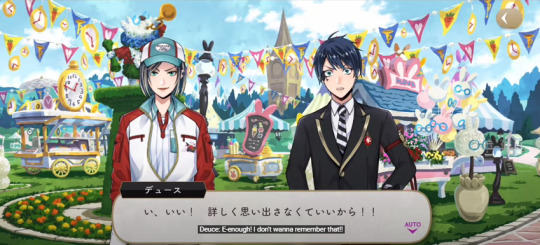
(translation credit to Ekala on Youtube!)
He has no siblings and was raised by his single mother, whom we have actually met! In the JP server, anyways! She shows up in Deuce's hometown event, the White Rabbit Festival. So, we have a name! Meet Dilla Spade (or Dilah? Dira? Deela?)! Romanization isn't clear yet; I'll just say "Dilla" for now. Also, we find out she's a delivery truck driver for the thematically-named White Rabbit Delivery company.
Deuce is shown to have been very close to his mom growing up, noticeable enough to the point that his old middle school friends teased him for it and called him "childish" (starsending vignette). We find early on that this is an important part to his story—when Deuce was in middle school, he was acting like a delinquent: skipping school, disrespecting teachers, being reckless and getting into fights. Then, one night, he overheard his mom talking to his grandma (only mention of his grandma that I know of, but, noted that she's in the picture too!), and he could tell that she was crying. She was feeling like a failure of a mother, and said that "maybe she never should have tried to raise him herself." Deuce, however, doesn't blame her at all. Seeing her like that really shook him up, and he resolved to "never do anything to make her cry" again. This is his motivation for wanting to be an honor student; he wants to be the opposite of what he was before and prove himself. He wants to be "someone she can be proud of."
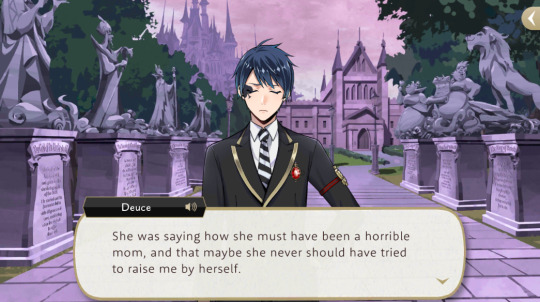
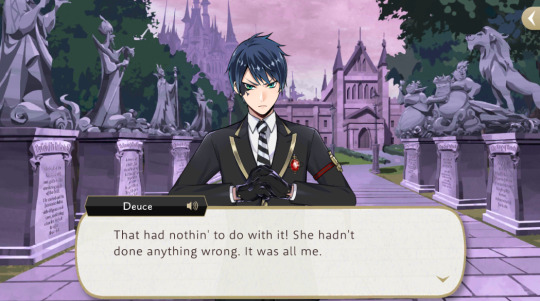
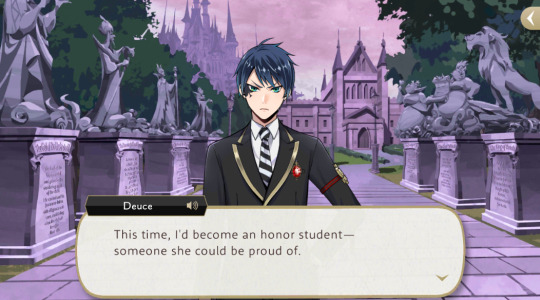
As far as I know, we don't have any mention of Deuce's father or what happened to him. From context and with what his mom said on the phone that day, she might have been a single parent from the start, with the father never being in the picture.
Deuce, in talking to Silver during Silver's Wish in the Starsending event upon Silver mentioning his father in his wish, talks about his mom and how she raised him as a single parent, saying "I know she's had her share of hard times... So I just want her to be happy now. I'd love for her to live a long life." In chapter 10 of the event, Deuce wishes to be a police officer, specifically a magic marshal, which is a hard job to get, saying that he is "sure my mom will worry a lot less if I get a respectable job." He also talks about this in his event vignette! He reveals that upon getting a bad reputation at home, people stopped trusting him, and they'd accuse him of things he didn't do, but if he said he didn't do it, there were always two people who believed him: his mom and the neighborhood police officer. The officer would always come by to talk to him and hear him out, and both he and his mom were very grateful for that. Deuce says that if he could be like that, maybe his mother wouldn't worry so much, so he decided that he wanted to be a police officer.
At the end of the event, in chapter 12, Dilla calls Deuce in excitement over the falling stars in the sky. In response to Deuce saying that yes he saw it, because he's a Stargazer, his mom replies that "Night Raven College couldn't have asked for a finer Stargazer than you." And she says she's proud of him and it's really sweet :)
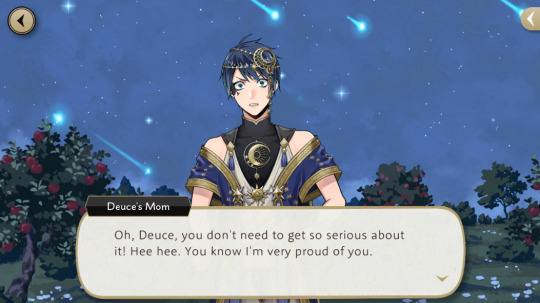
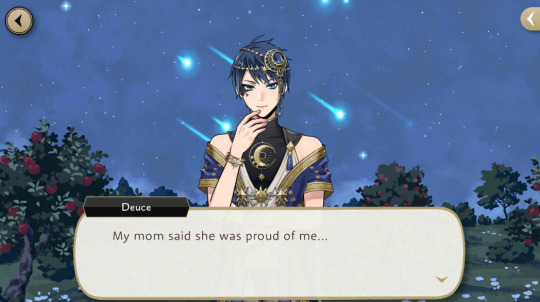
And then he starts crying happy tears :)
Anyways! Deuce's character arc can be a whole essay in itself, so back to his mom! Some of the stories we got include:
"Battlefield" Sales Shopping. Dilla would bring Deuce with her when shopping limited-time sales, which she seemed to seek out actively. Deuce recounts spending "forever" thumbing through pamphlets looking for sales, and Dilla would then coax him into coming with her, saying things like "Deuce is so strong, and can carry a lot." Deuce remembers getting shoved around a lot by the other customers, and so, he takes his sales quite seriously today (school uniform vignette, new year's vignette).
Spring cleaning! Or, winter cleaning? Dilla and Deuce would go on a cleaning frenzy after the holidays and before the new year, because “if the house is clean, we’ll feel renewed too” (new year’s voicelines)
In his apprentice chef vignette, Deuce recalls how recently, his mom got sick with a cold but didn't tell him until she was better. This made Deuce sad, because he wished she would depend on him a little more when she was struggling, so he was motivated to learn to cook so he could be more dependable.
Also in his apprentice chef vignette, Deuce says that he did help his mom "a little" with cooking back home and knew how to dice vegetables, and the ghost chef was impressed by his skills! So she seems to have taught him well.
In her own words she claims that she is not very good at cooking, but she does know a lot of egg dishes, because Deuce likes them (White Rabbit, 2-4)
She would bring Deuce to the office sometimes, so her coworkers know him (White Rabbit, 3-10). In the event, they were a little nervous around him at first but then were surprised to find how different his behavior was now compared to middle school, and they complimented him on getting into NRC.
She made Deuce a bunny outfit for the White Rabbit Festival long ago, saying that Deuce was complaining over not having anything special to wear, and she didn't have the money to make or buy an outfit, but she asked her coworkers for some spare fluff and made it work. She looks back on this fondly, saying she was just happy to see Deuce having fun at the festival. (chapter 6)
She is great with cars, but terrible with electronics (White Rabbit Festival, birthday boy vignette). Deuce has to show her how to do stuff and recounts “fixing” home devices by simply changing the batteries, and he is the one to set up appliances at home, as she refuses to read instruction manuals. She only uses her smartphone for calls and pictures. Dilla calls cars "trusted partners" but says that electronics are too “self-important” (White Rabbit, Chapter 2-6).
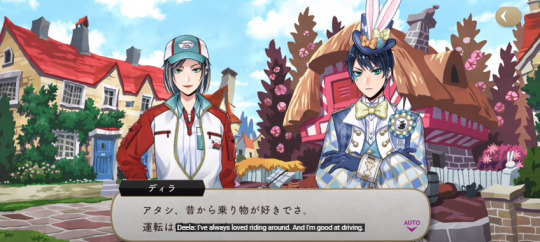
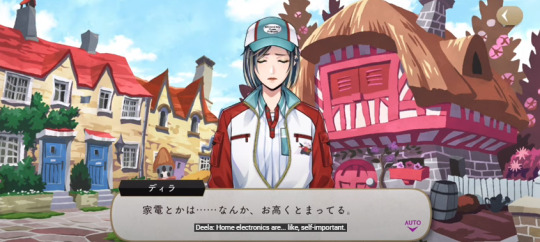
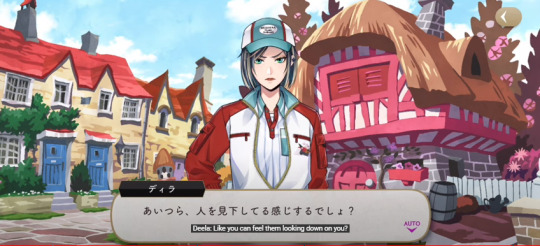
In this scene, Dilla also praises Deuce in front of his friends for "fixing" so many electronic things around the house, which embarrasses Deuce as he does not think it was that big of a deal. She also mentions embarrassing stories like she knows full well what she's doing, teasing in a very affectionate kind of way.
I do wonder if Dilla dragging Deuce onto shopping trips all the time was in part her way of finding ways to spend time with him. She really seems to care about him a lot, and quality time is something that means a lot to her, but perhaps she also struggles with connecting and really getting through to him. In White Rabbit, she mentions sadly how she used to take Deuce to the festival every year, but then he lost interest. Deuce sees this as normal, but it seems there were some growing pains there.
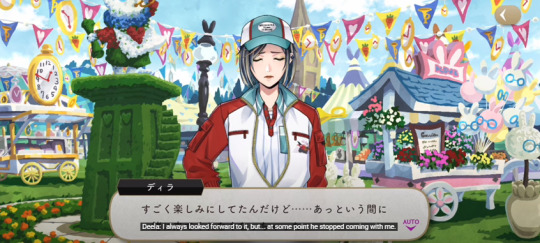
Also on another note which I honestly just find funny, there is a point in White Rabbit where Dilla is worried about Deuce having gotten hurt, and he says it's fine because he's "used to it," and she's just like...I don't how I feel about this but I support you! (sorry Dilla, your son's a budding shounen protagonist and his school's a disaster magnet. He's going to get so used to this haha)
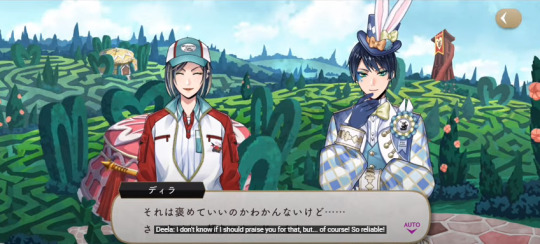
One more thing we really get to see from the event, Dilla definitely seems to have nerves of steel, too. Not revealing too much about what happens, she doesn't back down from this gang that is harassing her festival stall that her coworkers are terrified of, and then joins in with the idea to challenge them without hesitation. Deuce seems to allude to this when introducing Epel, saying that he thinks they'd get along because Epel has "grit and iron courage," as if he sees his mom the same way.
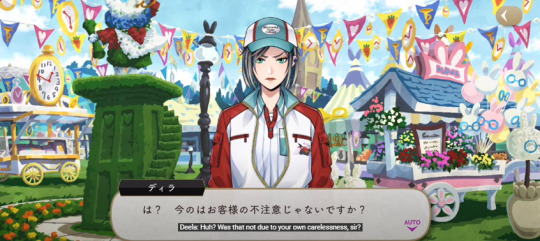
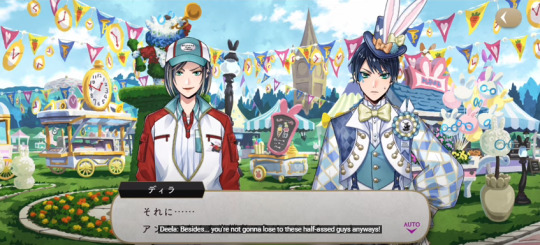
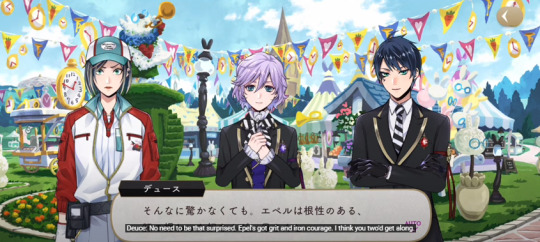
Going back to Deuce's story at the beginning...I feel like this is pretty significant, too. The impression I get from all of this is that she's scrappy and resourceful, strong-willed and vigorous, someone who'll keep an easy sense of humor and a smile in the face of a challenge... but also, she's someone who will bend over backwards to hide her struggles, such as when she hid her being sick with a cold from Deuce. Which is to say, she doesn't seem like the type to be brought to tears easily. This being just speculation on my part, but what if, that day Deuce overheard her on the phone, that was the first time Deuce really saw her break down like that? His mom, the strongest person he knows, the one always keeping up a smile? Although, in the background, she probably hid so many of the struggles she did have? Just saying, it'd have a lot of impact, I'd think...realizing the turmoil he put her through to get her like that...
But that said, I think it's important to note that she cares about him a lot, and she is proud of Deuce and who he's become, and I don't think that hinges at all on him becoming an honors student. Deuce struggles to try to make himself more reliable, but Dilla says as much in White Rabbit: he doesn't have to "go overboard." It doesn't have to be complicated. She just wants him to live life and be happy, simple as that. And also he could come home every once in a while, too :)
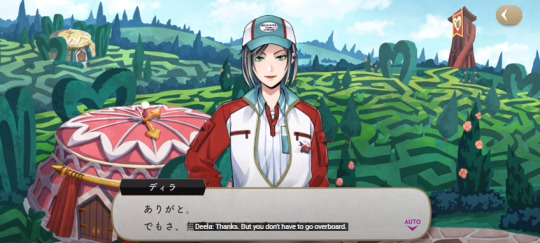
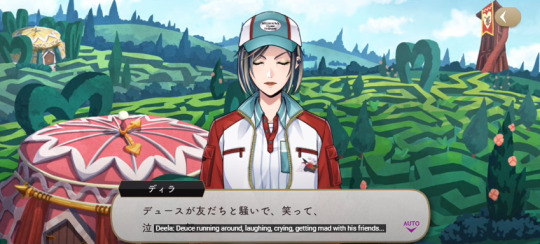
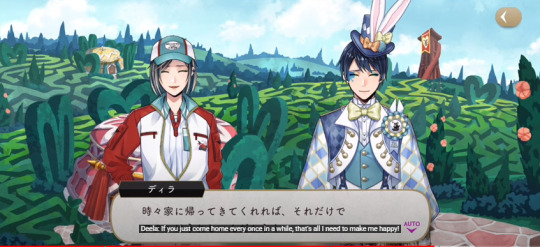
#twisted wonderland#twst#twst lore#twst family lore#ace trappola#deuce spade#anyways I am very invested in all of these people now#deuce's relationship with his mom giving me so many feelings#it's so sweet#and I'm also sobbing for them both :')#maybe one of these days I will write that Deuce essay#on top of all the other things I want to write#anyhow in other news I'm serious about wanting to meet Ace's brother#he sounds like such a gremlin#I love him already XD
66 notes
·
View notes
Text
Calling Sims 2 Lore Aficionados!
Hello, Sims 2 players … are you … addicted … to Sims 2 lore?
Have I got a treat for you!
So, before I got into modding, I wrote a lot. Mostly novelizations of my favorite slasher/horror films via Fanfiction.net lol
Now, with my Sims obsession blossoming, I want to bring in my writing skills.
Tales of SimNation
I really want to create for the Sims 2. Not just mods, but creative fiction. Documenting Sim history as they see it and as how I, and players, interpret it. I want to write about them. Write about their universe. Weave together a cohesive narrative with the fun added challenge of clearing up EA/Maxis discrepancies.
I want to write it in narrative fashion, kind of like a historical novel that combines Sims 1, 2, and 3 lore (maybe throw in some weird stuff at the end about the "alternate timeline" of Sims 4 ... ) but it shouldn't be hard to plod through if you know what I mean. Fun, and Sim-my.
Maybe some dark stuff here and there like describing Olive Specter’s adolescence (I plan on a volume that entails the events of Midnight Hollow TS3 Store World and yes, Olive Specter is a character there before Strangetown!) or like neighborhood/character corruption being used to describe political corruption in the hood.
I will start it with the citizens of Roaring Heights, told in multiple “vignettes”, embroiled in a technological feud with the “innovation capital” of early Sim Nation: Twinbrook.
This excerpt is an unfinished Table of Contents and Prologue, and then the first “vignette”, told by a local author in Roaring Heights, who takes you through a brief history of early Sim Nation.
As far as other stories in Roaring Heights for Volume #1, I will describe Consort Capp’s life as a young adult - he is a character in Sims 3 Roaring Heights along with HIS parents, Hector and Andromache Thebe!
Here’s where we get into the discrepancy of the Capp family - I made this another link for those who aren’t interested in Veronaville lore. This is just ONE of many of Veronaville's discrepancies (I was not a Veronaville kid, y'all may have to fill in the gaps in my research).
Ultimately, the novel (in a series of volumes) will HAVE to culminate in the iconic abduction of Bella, Don’s ass getting whisked to Riverview and Dina and Nina taking a little trip to Barnacle Bay.
Obviously, it can be an endless ongoing story! And Simmers are free to chime in!
What hoods should I include in the early days of Sim Nation?
I honestly don’t think I could write for Sims Medieval.
I can think of the early worlds/hoods post-medieval as being obviously Veronaville (described as “Old Country”- Goths may have descended from there, I feel like Altos from S3 might have as well - they are a parody of the Sopranos so…), Midnight Hollow, Moonlight Falls, Roaring Heights, Twinbrook, Starlight Shores (its bio references a 300-year old beginning) and possibly Sunset Valley (what became Pleasantview. I will also have to work out how Sunset Valley changed into a tiny town like Pleasantview lol). Bridgeport may have also started around then by a man named Ebenezer Alto - another possible source of the Altos. Then, of course, there's Strangetown ... UGHHH there’s too much to try and weave together, but I like a challenge …
I’ll keep everyone posted!
EDIT: Or course, SimCity from Sims 1 will be featured. Between Sims 3 and Sims 2 events
#sims 2 simblr#sims community#sims 2#sims 2 lore#ts2 lore#ts2#ts2 stories#ts2 fiction#ts2 novel#ts2 novelization#sims 2 stories#sims 2 storytelling#sims 2 legacy#sims 2 veronaville#sims 3 roaring heights#Sims 3 lore#the sims 3#sims 3 story#sims story#sims fiction#sims 2 pleasantview
13 notes
·
View notes
Text
Siren’s movie recs!
(Asian cinema edition)
making this for @faerouzia but thought it’d be cool to share (and yes, i posted this on my fanfiction account with little to no shame.)
Rebels of the Neon God (1992)
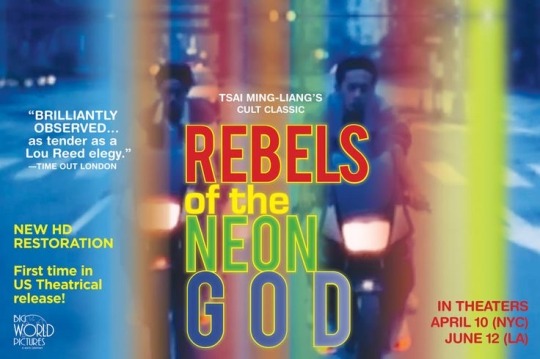
Rebels of the Neon God is a cinematic masterpiece. I honestly consider all of the films on this list as such but each have their own particular stylistic niches and camera work. If you’ve watched any films by Wong Kar-Wai (Days of being wild, Chungking Express, In the mood for love, Fallen Angels, Happy together, etc) you’d more than likely enjoy this one as well. The film follows a group of teens living in Taipei, two thief’s, a sex worker, and another who follows them throughout their journey. Rebels of the Neon God captures the daily, real life struggles of these characters and the realities of living in a bustling city that gives no room for its inhabitants to navigate life slowly. It’s almost episodical to me? In some way? Rather than it flowing into a central plot line, the film communicates its meaning through a series of happenings rather than it amounting to one fully formed story. There are themes of queer desire that I’ve noted as a queer person myself—and I enjoyed it.
Days of being wild (1990)
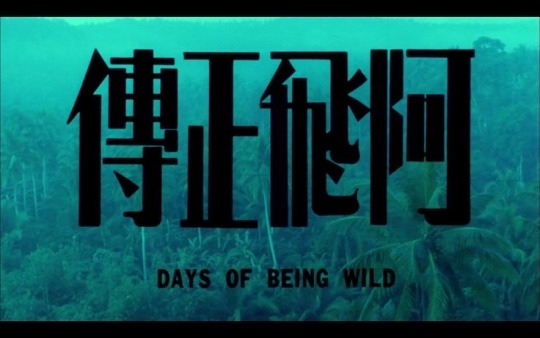

Days of being wild is placed sometime in the 1960’s in Hong Kong. This falls within my top three Wong Kar-Wai films, and in my personal opinion, is one of his more underrated works. It lacks in the plot whimsicality of his more notable works but has an underlying intensity I’d categorize with In the Mood for Love. It follows an intricate thread of “almost” loves between Yuddy, a player with a strained relationship with his mother, and Li-Zhen—a box office attendant who we fleetingly pursued before she fell in love with him. Several characters are introduced as we explore the individual but intertwined stories of Li-Zhen and Yuddy. Also Leslie Cheung plays Yuddy…and that’s all I needed to want to see it.
Millennium Mambo (2001)

Millennium Mambo has a special place in my heart. I’ve watched this film as a teenager and I find myself relating to the dead end visions of my youth now that I’m twenty four. The usage of neon pallets and light encompass the beauty of a lot of Asian cinema—(which is interesting since I’ve noticed that a lot of European films utilize shadows, so it’s cool to see some stylistic trends that can define particular genres or storylines) and MM is a visually striking work of art. I’ll never forget how it felt to watch Millennium’s opening sequence for the first time when Vicky walks away with a cigarette in hand with a moving and bleak monologue. The beginning ends with a goodbye and now that I’m older I find myself relating to Vicky and how lost she is, as she attempts to find comfort in tumultuous romances but it doing nothing to guide her out of the discomfort of the unknown.
Katatsumori (1994)

You can find this forty minute film by Naomi Kawase on YouTube. It’s heartwrenching and filled with a palpable message of how fleeting life is without addressing it. Naomi Kawase, who was raised by her great aunt, stitched together a series of vignettes and home videos she’d filmed of her before she moves out of the home she was raised in. I cried while watching it and there wasn’t any scene in particular that seemed motivated to make it’s viewers cry—but a nostalgia that wasn’t mine overwhelmed me. It’s a story that’s beautifully told from the lens of everyday life and communicates the fear of watching our guardians grow old.
Us and Them (2018)

Prefacing for anyone that hasn’t noticed yet—I’m a sensitive person and a crybaby. I’m crying just by thinking of this film. Us and Them follows XiaoXiao and Jiaoqing’s relationship and it’s stages over the next few years, relaying a love that morphs but never leaves, as well as the process of coming to terms with its meaning. It’s an incredibly well-done and bittersweet film that navigates love, loss, and friendship. This is definitely one of my favorite movies—but I’m also an emotional masochist so I’ve watched this several times back to back. Below, I’ll be sharing a screenshot from a Reddit post discussing the film, as the user provided insight on the films use of character arrangements in the title.
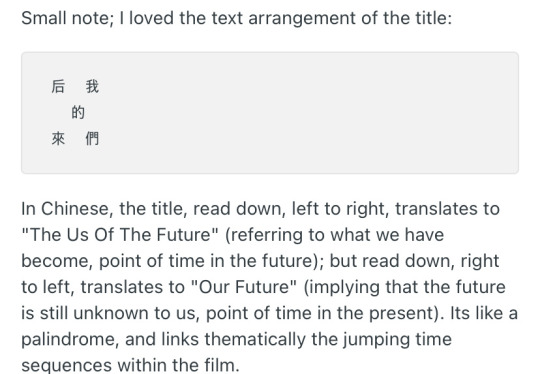
Paprika (2006)

Oh my god, Paprika. If you’re familiar with any Satoshi Kon’s works, it makes sense that this is one of his films. Dr. Atsuko Chiba is a dream detective working on a device called the DC Mini— a powerful device that they’d created with hopes of helping psychiatric patients. When it’s stolen, she and her colleague attempt to recover it before all hell breaks loose. Paprika is many things: visually stunning and almost psychedelic in both its coloring and animation— it traverses the dream world in such an enticing way. I thought it was important to recommend at least on animated film!
Exhuma (2024)
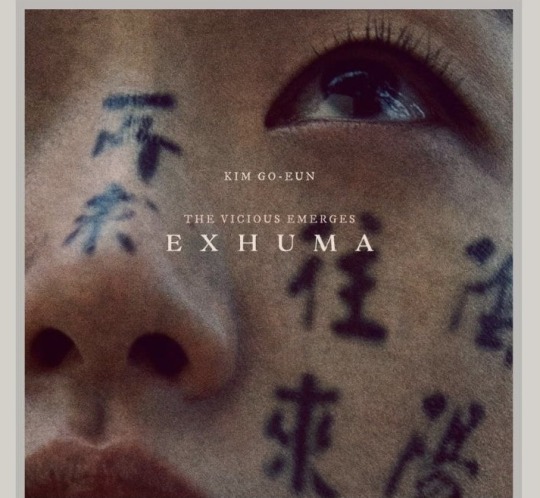
And alas, a horror film! This is by far one of my favorite recently released Asian horror movies. Kim Go-eun and Lee Dohyun play their characters phenomenally well. The film follows a duo of skilled Shamans, as they attempt to thwart their clients consequences of excavating the wrong grave. Exhuma has an underbelly to it and covers a deeply rooted and complex historical take about the estranged relationship between South Korea and Japan with mysticism and elements of horror.
Secrets in the hot springs (2018)
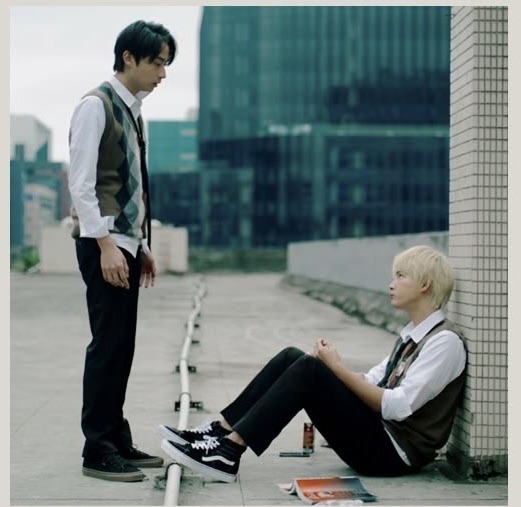
Guys, when I tell you this movie positively CRACKED me up— I mean it. I don’t even know where to section this, genre wise, but it’s like a mystery-comedy? The film covers a chance adventure between three teen outcasts as they take a trip to Chieh Hsiao-chin’s family owned Hot Spring Hotel. They’re greeted by the sight of a derelict inn ran by his eccentric grandparents and things eventually start to unfold as they start seeing strange… ghostly appearances during their stay. I haven’t seen enough people talk about this and I genuinely think people should watch this if they like unserious horror.
Siren’s Author Note: Quite bold of me to post this on my fanfiction account but this is a blog I use generally so….
It’s my first time posting film recommendations, so I hope that this exposes any newbies or veteran’s to Asian Cinema if they come across my very small blog. lol
#film#film recommendations#movie review#movie recommendation#movies#film reviews#film review#siren’s film recs#lgbt film#queer film#film reccs#movie recc#asian cinema#days of being wild#exhuma#millennium mambo#paprika#secrets in the hot spring#us and them#rebels of the neon god#kiss of the rabbit god
7 notes
·
View notes
Text
The psychological paradoxes of Utsukushii Kare, part 1: Covert grandiosity and finding status through idealization
I’ve had some thoughts about Utsukushii Kare bouncing around in my head since the end of season 2. I started to post about them back then but my first attempts stalled out. Maybe the ideas involved were too complex, or I just needed to let them marinate a bit longer. I tried to give up on getting them on “paper,” but they just wouldn’t leave me alone. Eventually I returned to them and everything clicked. This is part one of my attempt to get those ideas down. After a ridiculous amount of tinkering, it seems like the right time to let it see the light of day. Subsequent posts are in different stages of readiness as well.
I wouldn’t have finished this without copious encouragement and feedback from @lurkingshan and specific edits from @wen-kexing-apologist. A kind comment from @nieves-de-sugui was a shot in the arm. And I’m always indebted to @porridgefeast for support, encouragement, and cute animal content.
I’ve written a lot about this series in the past; refer to my Utsukare master post for a continuously updated list. This includes some related posts on pursuer/distancer dynamics and attachment style in the series that have some overlap with what I’m discussing here, but this post should also stand on its own quite well.
A few things to note at the outset:
My focus here is on the series (both seasons), but I will refer to the movie, the novel, and a couple of vignettes when they illustrate points that are consistent with and relevant to the series.
My approach in this series of posts involves viewing fictional characters the way I would if they were real people--a bit like if I were to do a case conceptualization of a potential client. This isn’t always the approach I use, or the best one, but I thought it was a good fit for what I wanted to discuss here.
Quotes will be cited, but general information on sources will be given at the end of the post.
Now, to get down to business.
* * * * * * *
I’ve seen a lot of commentary from other Utsukare fans about Hira and Kiyoi and how much their self-worth–and the lack thereof–impacts their relationship. It’s a clear theme and lots of folks have had salient insights about it. But one thing I haven’t seen in any of the posts I’ve read is a full acknowledgement of the duality at play there–the way that both characters sometimes believe, or at least fear, that they’re irredeemably awful and at the same time believe, or perhaps hope, that they are better than everyone else.
I’m sure someone reading this is thinking, “Kiyoi is like that, sure. But Hira? Thinking he’s superior? Come on.” I get that it isn’t always apparent. In a genre that loves to portray profoundly smitten, devoted characters, Hira stands out as intensely, even excessively, whipped. But yes, Hira totally sees himself as superior to others in some important ways. Even before Noguchi Hiromi took his inventory about this so mercilessly, there were plenty of other signs.
covert grandiosity and idealization
Our introduction to Hira is his description of the “pyramid” social structure he experiences at school and how he’s at the lowest level of that pyramid (invisible at best, a visible target at worst). At first glance, this seems self-deprecating. But Hira is just describing where he falls in the structure, not endorsing the structure or his place in it. This sets up an important distinction that comes up continually in Hira’s thinking. Sometimes he really thinks badly of himself. But other times, he’s reporting how, in his view at least, others think of him. Sometimes he’s resigned to the ways others see him, but other times, he rebels against them. He doesn’t always make it clear which of these things he’s doing at a given time, but if you know what to look for it starts to be easier to pick out.
Mind you, it’s still very clear that there are ways in which Hira does view himself extremely negatively. His belief that he’s unworthy of Kiyoi is particularly strong. It inspires a lot of demeaning metaphors about himself, like calling himself a “pebble.” His belief in his unworthiness is linked to the belief that Kiyoi can’t possibly return his feelings or that if he does, it’s a bizarre miracle that can’t possibly last over the long term. The most remarkable thing about this belief is its incredible persistence, even in the face of example after example of evidence that Kiyoi loves and values him too and wants them to stay together. But denigrating himself in this context has a different meaning from what it would in others, as I'll get into in more detail shortly.
It’s a pretty universal human tendency to pay more attention to information that confirms our biases than information that challenges them. We’re also hard-wired to be more attentive to perceived threats (including threats to our sense of self-worth) than we are to less threatening things (and ideas). Both of these tendencies contribute to the fact that most of us fail to notice when our negative beliefs are being disproven.
I’ll be discussing this in more depth in part 2, but for now, I’ll just say that resistance to disproving a negative belief is very normal, but Hira’s stubbornness is way beyond what’s typical. He continually misinterprets or simply ignores clear signs of Kiyoi’s interest in and regard for him. I mean, most of us, no matter how poor our self-esteem is, no matter how jaded and pessimistic we are, would, if kissed by someone we’re in love with, at least entertain the possibility that they might like us a little bit. Not only does Hira not consider this possibility, he comes up with the rather bizarre interpretation that the graduation day kiss was Kiyoi’s way of telling him to leave him alone.
So, why would anyone be as stubbornly negative on this point as Hira is? Part of it is the strength of his negative beliefs and the degree of his bias. But there’s another reason as well, one I’m going to circle back to in a moment.
First, let’s look at Noguchi’s assessment of Hira in season 2, episode 4, which is very pertinent here. Talking about Hira’s submission to the Young Photographica contest, Noguchi says:
It was such a childish photo. You should've just chosen an empty place rather than erasing people. Going out of your way to [erase] people made it very clear that you hate this world. What I felt from your photo was tremendous selfishness and disgust. You haven't succeeded at all, but you think you're amazing. But instead of showing it outright, you make a shell by belittling yourself. You look down on this world with youth, stupidity, and ambiguity….You're just like the old me.
(dialogue from Viki subtitles)
It’s a little bit of a stretch, I think, to suggest that Noguchi can really tell all of this just by looking at a single photo (or even Hira’s entire portfolio). I think this partly happens just for the convenience of the story. But if I had to justify it, I’d say Noguchi has this much insight because, as he says, he used to be like Hira, making this a “takes one to know one” situation.
Hira confirms that Noguchi is correct here. “It’s like he sees right through me,” he thinks. So how do we reconcile this with Hira’s apparent negative self-image? Well, first off, it’s not unusual at all for very negative and excessively positive beliefs about the self to coexist in the same person. Take narcissism for example. People tend to think of narcissists as grandiose, thinking they’re amazing and special to a degree that’s clearly distorted. And that is one of the key symptoms of narcissism. But it’s also typical for narcissists to believe that if they aren’t remarkably special, they’re totally worthless. They have a hard time sitting with moderate (hence realistic) beliefs about themselves.
This kind of narcissistic tendency is really strong in people with Narcissistic Personality Disorder, but it’s present in a milder version in a lot of people (I suspect it’s present in most people, to some extent and under certain circumstances). Narcissistic personality traits are supposed to be linked to getting stuck at a developmental stage that ideally gets worked through during childhood. But a lot of us have at least a little bit of unfinished business from that period. I think Hira has a ton of unresolved stuff in this area. I definitely don’t think he would meet criteria for NPD. But I think that when he was in that developmental stage, he came up with some maladaptive strategies that helped him to get through it. As a result, he didn’t get stuck in the full-blown grandiose version of NPD, but he did get stuck with those maladaptive strategies, and they became a part of his personality instead. And he did retain 1) some of that highly polarized idea of self-worth (“I’m either the best ever or complete garbage”) and 2) some degree of belief in his superiority to others, no matter how shameful he finds it or how carefully he conceals it.
It’s also worth noting here that adolescents aren’t typically supposed to be diagnosed with personality disorders and even diagnosing young adults is often discouraged. This is because adolescence and early adulthood are times of intense change and development and the natural process of maturing can cause personality disorder symptoms to resolve even without mental health treatment. So that’s yet another reason to be wary of labeling Hira with any such diagnosis. This points to a major theme of the show, which is the fact that the central characters are works in progress. They aren’t fully formed adults yet, and that gives them a chance to improve themselves before they become set in their ways.
Getting back to Noguchi’s points: Hira is pretty misanthropic, although it’s often shown in pretty subtle ways in the show. This aspect of Hira is more noticeable in the novel. For one thing, the novel establishes early on that the erasing-people-from-photos thing isn’t some new or isolated phenomenon. Rather, the main thing Hira does with his camera at the beginning of the story is to intentionally take photos of populated areas and then carefully photoshop out all of the people. And it’s explicitly because he dislikes, even hates, most of humanity. This tendency still comes through in the series. Sometimes it’s obvious–remember those mass shooting fantasies?--and other times, it’s more subtle. We know that this aspect of the character is definitely still present in the series version of Hira since he confirms what Noguchi says about how his photo shows “selfishness and disgust.” He really is disgusted by many of the people around him.
making a shell - perfectionism and covert grandiosity
What about the part of Noguchi’s spiel where he says that Hira “make[s] a shell by belittling [himself]?” It took me some thinking to realize what (in my view) he meant by that.
This actually syncs up really well with something Noguchi says about Hira in Utsukushii Kare: Eternal. It’s illuminating enough that I’m making an exception here to confining myself to the time period of the series.
In this scene, Kiyoi is scheduled to be photographed by Noguchi on a day that Hira isn’t present at his studio. He asks about Hira and he and Noguchi talk about him briefly. Hearing that Kiyoi was Hira’s high school classmate, Noguchi talks about how weird and confining high school is, a terrible “environment for growth.” He says that doesn’t apply to Hira, though, because he’s “a king in sheep’s clothing.” This catches Kiyoi’s attention. “I was just thinking that you understand him really well,” he tells Noguchi. “I do,” Noguchi replies. “Although he looks timid and weak, he’s actually really strong.”
As Noguchi continues, his comments become more metaphorical and get harder to understand. (I suspect that the metaphors he uses might be idiomatic or otherwise intelligible to a Japanese audience in a way that’s difficult to get across in translation.) The gist is that he sees Hira as “strong-minded,” but that “in his heart” he has a kind of “sanctuary” that he protects from others, and that this could end up either holding Hira back or being something he can use to get somewhere in life. I’m not sure what to make of the sanctuary part, but it’s clear that Noguchi understands that Hira has thoughts and emotions that he doesn’t share with anyone, and that his image as a “sheep” who is “timid and weak” masks an unseen strength and determination, along with a more king-like attitude toward the world than he typically shows to others.
Time for a quick psychological theory sidebar, this time on perfectionism.
Some researchers who study perfectionism have identified a type they call “narcissistic perfectionism.” Narcissistic perfectionists think that they are, or need to be, perfect, and they expect others to be the same way, thinking about them in highly negative ways if they don’t measure up. If you read about this idea, most of the examples given to illustrate it are people who have achieved a lot in their lives, who can point to big accomplishments. But perfectionism doesn’t always result in achievements. Sometimes it keeps people stuck in a mindset that anything but perfection is pointless, making them reluctant to really try to do anything at all. If you’re a perfectionist who has a need to believe you’re special, that you would achieve big things if you tried, actually trying means taking a risk that you’ll find out that when you try, the results aren’t actually perfect and amazing.
According to narcissistic thinking, this would mean that you’re worthless, because the options are either being the best or being complete garbage. Again, I think it’s an overstatement and an oversimplification to call Hira a narcissist, but he has unresolved self-worth baggage that takes a somewhat narcissistic shape. In this way, he shows a kind of perfectionism that seems clearly underpinned by his self-worth issues. Instead of fueling achievements, this perfectionism keeps him stuck, inactive, too afraid to attempt what he thinks he might be able to do while clinging to a fantasy of what he could do if he ever got un-stuck and really tried.
That’s usually a secret. Remember when Hira didn’t make it through the first cut of the contest? He thought, “Even though I always deny it out loud, I did think photography was the one thing I can do. It felt like I was being ripped apart for being conceited" (dialogue from a fansub by @lollipopsub). The fact that he would "deny it out loud" is notable. I also think that he’s still not being entirely candid. If he thought “photography was the one thing [he] can do,” that wouldn’t exactly be “conceited”--it would actually be quite modest (about photography) and harshly self-critical (about everything else). I think deep down he has thoughts that are truly conceited, thoughts that he’s not just competent when it comes to photography, but “amazing,” as Noguchi puts it. Once again, Hira confirms everything Noguchi said with his “he sees right through me” reaction, so he agrees with this assessment.
This conceited side of Hira is never supposed to see the light of day. This is the main reason he’s so intensely embarrassed when Noguchi understands him so well, I think. It’s what Noguchi is talking about when he says that Hira “make[s] a shell by belittling [him]self.” Acting as if he’s the lowest of the low is a defense. It does correspond to the part of himself that fears, at times even believes, that he’s worthless. But it’s also a way of hiding his grandiose side. This is a way of protecting himself from the reaction others would have if they could see how highly he thinks of himself despite not having made enough effort to accomplish the sorts of things he thinks he’s capable of. It’s also a way of protecting himself from his own awareness of his shortcomings and pretensions.
There’s another type of perfectionism researchers have identified, called “covert perfectionism,” in which the person’s outward expectations of others are low and they don’t show their perfectionistic traits outwardly very much, if at all. They’re supposed to be more likely than some types to get trapped in the kind of stuckness I mentioned earlier, in which perfectionism prevents the person from making a real effort at things they would like to do well. In some important ways, Hira’s perfectionism resembles this type as well. You could say that his type of perfectionism has definite narcissistic attributes, but he hides it well enough that it is also covert.
A number of different articles on perfectionism that I looked at cited the same Brene Brown quote about it, from her book The Gifts of Imperfection. I think it’s very salient here. She writes:
Perfectionism is a self-destructive and addictive belief system that fuels this primary thought: If I look perfect, and do everything perfectly, I can avoid or minimize the painful feelings of shame, judgment, and blame.
This is very characteristic of Hira. He doesn’t expect to “look perfect” in most respects (he’s more likely to simply try to go unnoticed). But he is obsessed with avoiding those painful emotions. He has spent his entire life being shamed and judged and living in fear of it happening still more. He’s very strategic and has given a lot of thought to how best to avoid being shamed. In fact, these efforts seem to be part of the reason he is such an avid observer of the social structures around him–learning about those structures is a survival skill for him.
idealization and affiliation: borrowing status
In addition to factoring in his covert grandiosity, I think there’s something else to account for when looking closely at Hira’s apparent self-hatred. Hira’s self-critical tendencies can appear inflated if we lump examples that pertain to his relationship with Kiyoi in with other cases. They should actually be looked at separately, because their meanings are distinctly different. Again, I don’t contest that Hira has a low opinion of himself in a lot of respects. But I think when we step back and look at many of the biggest examples of what appears to be a negative view of himself, a lot of them are focused on where he stands in relation to Kiyoi. That’s not the same thing as his value as a person. And placing himself in a certain role in relation to Kiyoi has a specific kind of meaning for him, along with a specific kind of payoff.
Here comes another theoretical interlude. This time, I’m going to briefly touch on Heinz Kohut’s idea of the need for idealization.
Kohut was the originator of a school of thought called self psychology, a branch of psychoanalysis that underpins a lot of contemporary psychoanalytic/psychodynamic theory and practice. He was also an expert on narcissism and basically saw variations and degrees of narcissism as central to a lot of psychological challenges. (There’s some reason to believe Kohut may himself have had narcissistic personality disorder, which would have made him intimately familiar with its inner workings.)
Kohut’s self psychology departed from Freud’s whole psychosexual development model (basically, everyone’s least favorite aspect of Freudianism—the part with all the penis envy and Oedipal stuff and so forth). In its place, self psychology focuses on how we see ourselves, what our needs are in terms of self-image, and other matters that are very relevant to this discussion. One of Kohut’s most important insights was his observation that even when other people have a big impact on our psychological state, what we’re interacting with isn’t so much the other person themselves but our internalized idea of that person. Kohut called internalized versions of people and things from our external world “selfobjects.” (I’ll be circling back to this momentarily.)
One of Kohut’s most central concepts is idealization. In Kohut’s version of idealization, a person views someone else as basically perfect, maybe even omnipotent. The idealized person becomes a special kind of selfobject. In the best case scenario, the person doing the idealizing has some kind of real, personal connection to the idealized person. But even a mental connection to them via their status as a selfobject can meet a need in some ways.
By feeling connected to, or even just affiliated with, the idealized person, the idealizer feels like they take on some degree of the qualities they see in the idealized person. It’s not hard to see how this tendency would date back to childhood. Children have a particular need to idealize their parents at certain stages in their development. Thinking of their parents as strong, capable, in control, wise, calm, etc. gives children a sense of safety and a sort of borrowed self-esteem.
Once you’ve idealized someone, you feel a real need to continue to see them as special and powerful. Again, childrens’ views of their parents are a good example here. One reason children often blame themselves when they are neglected or abused is because they have a strong need to continue to view their parents favorably. Without that favorable view of their parent, their world would seem chaotic and dangerous. Blaming themselves often seems safer. Here, maintaining the high status of the idealized person is so important that it’s a bigger priority than preserving self-worth.
I bet you can guess where I’m going with this. Yep, Hira idealizes Kiyoi in the Kohutian sense of the word. There are a number of facets of this. Part of it involves viewing Kiyoi as basically perfect–outstanding in every way. Even when Hira sees Kiyoi as cruel, he seems to view this as an ideal attribute for someone like Kiyoi.
Hira not only states that he thinks of Kiyoi as “like a God" in season 1, episode 6, he frequently expects Kiyoi to have god-like qualities and abilities. In one of Nagira Yuu's shorter pieces about Hira and Kiyoi that's told from Hira's perspective, he's explicit about this. "Kiyoi's existence is already in a much higher dimension than human beings," he thinks. "Is he the successful fusion of deity and human? That is the big question" ("Wonderful World," as translated by @sparkling-rain). At points during the series, he expects Kiyoi to have a superhuman degree of freedom to do anything he wishes and to know things that would require him to read Hira's mind. He really does treat him as if he’s practically omnipotent.
Hira's idealization of Kiyoi has a number of implications. One is that Hira misunderstands the social structure at his school. He views Kiyoi as the unquestioned king and doesn’t see that in many ways, Kiyoi makes choices about how to behave in school out of a desire to stay on the good side of bullies like Shirota. This fundamental misunderstanding in turn makes it impossible for Hira to notice or understand all the ways Kiyoi tries to protect him at school. If Kiyoi were really at the peak of the school hierarchy, if he wanted to be nice to Hira, he would just do it. But because he has to maintain a certain image in order to keep himself safe, he has to help Hira in covert ways. For example, when Kiyoi admonishes Yoshida not to order Hira around or use his demeaning, ableist nickname, he makes it seem like he just wants Hira to be at his beck and call, which wouldn’t be possible if he were occupied doing tasks for others. But if that were the case, why would he object to Yoshida using the nickname? For that matter, why doesn’t Kiyoi ever use the nickname himself? (He says it aloud in his exchange with Yoshida, but he never actually uses it to address Hira.) If Hira weren’t so invested in the idea of Kiyoi’s supreme power, he might have noticed these disparities between his narrative and reality within the story.
In season 2, the fact that Hira is both someone who has a relationship with Kiyoi and at the same time is a fan of Kiyoi as a performer points out another aspect of idealization. While I’ve never seen Kohut’s concept of idealization applied to fandom, I think there’s at least a variation of it at play when we feel comforted by, or as if we gain status from, being a fan of a person (or a group, piece of media, etc.) that we see as special or powerful. When we get excited because the sports team we root for does well or our favorite actor wins an award or is in a movie or show that does well, I think we’re experiencing a kind of gratification based on a selfobject that we feel is ideal in some way. Our status as fans gives us an affiliation that feels similar to a real connection. (Parasocial relationships are related to this as well–something that’s likely to resonate with those of us who participate in BL fandom, where examples of parasocial relationships abound.)
So both as a fan and as a classmate, then a (sort of) friend, then a boyfriend, Hira gets a great deal of satisfaction and happiness from idealizing Kiyoi and feeling like he has a kind of tie to him. This is completely interwoven with the love he feels for Kiyoi in the beginning. But it also makes it very difficult for him to acknowledge the ways in which Kiyoi doesn’t actually resemble his initial, idealized selfobject of him. Kiyoi isn’t omnipotent. He was never actually the most powerful person in their high school class. In many ways, he’s actually a better person than his selfobject version. Although Kiyoi isn’t the nicest person ever, he’s not nearly as cruel as the cold, imperious figure Hira paints him as.
Sometimes Hira chooses this selfobject over Kiyoi the human being, and Kiyoi knows it. In season 1, episode 4, when Hira starts to get close to Kiyoi but then backs off, protesting that he’s just a “servant” and Kiyoi is his “king,” Kiyoi responds by telling him (in the Viki subtitle translation), “I don’t care if you chase your ideal of me, but leave the real me alone.” This dynamic, of course, is a huge theme in their relationship that continues all the way to the end of season 2 and beyond.
Those are some of the ways in which Hira insists on maintaining his idealized selfobject of Kiyoi. But there’s another way he clings to this idealization, which I think is harder to see at first: in order for Kiyoi to be elevated, Hira has to be beneath him. This is actually one of the most paradoxical parts of this paradoxical structure, because in Hira’s view, he has to be beneath Kiyoi in order for Kiyoi to be exalted, but by exalting Kiyoi, Hira’s status is raised. It sounds strange at first, but it’s not a new idea. The notion of humbly dedicating oneself to someone or something that you uphold as an ideal sounds like an act of self-abnegation, but in the minds of those who take on such a role, by affiliating themselves with this perfect person or thing, some of the magical aura of that perfection rubs off on them.
It’s a bit like members of the clergy in the past (in a Christian/European context), who were known to humble themselves completely, taking vows of poverty, depriving themselves in various ways, even mortifying their flesh. Through these humbling acts, these people were seen by themselves and others as closer to God than an ordinary person, potentially as a channel to God–even as someone who could actually speak for God. By humbling themselves and exalting their ideal, they became something greater than they would ever have been capable of being on their own. Hira’s approach is remarkably similar. In keeping with his description of Kiyoi as a kind of god, he talks about wanting to be a “nun.” (As I understand it, he’s describing a role more like that of a shrine maiden in Shintoism than a nun in any Christian tradition, but there’s enough similarity in those roles to justify the translation.) Basically, if you make your ideal person perfect enough, then even being their servant gives you a lot of status, especially if you’re their most devoted, indispensable servant.
I’m reminded of a passage from the novel here. In the novel version of the story, Kiyoi visits Hira at his new home. A different situation than the one in the series has led to him living alone for the first time, and as in the series, Kiyoi uses his need for a rehearsal space as an excuse to visit Hira there. The situation is somewhat different from the series, but similar in essentials. Hira and Kiyoi have a conversation that leads to an exchange that is equivalent to the conversation that takes place right after the finger incident in the series. In the novel, this scene is portrayed from Kiyoi’s point of view; anything in italics is his internal dialogue. (The ellipsis below is mine.)
‘What am I to you?’
‘The person I love most in the word.’
It was this firm response that gave Kiyoi courage.
‘Then, do you want to date me?’
Kiyoi felt his face burning. Just say yes. If you do, I’ll be able to be honest too. Kiyoi’s heart was pounding as he waited for Hira’s answer, but the answer he got was something that he hadn’t expected.
‘I don’t want to.’
Kiyoi blinked.
‘Why?’
…
‘Because you’re the king.’
‘Huh?’
Kiyoi’s eyes blinked even faster than before.
‘I mean…Kiyoi is like a king, and I’m merely an ordinary person who serves the king; it’s not like I do it out of obligation, but in my mind, I view myself as Captain Duck…Ah, by Captain Duck, I’m referring to a yellow toy in the shape of a duck that children play with in swimming pools or bathtubs, you know?’
–I know, but what does that have to do with it?
Not caring about Kiyoi, who wanted to ask something, Hira continued to explain about the duck. He kept babbling on and on about how Captain Duck once used to float in the sewage and was now proudly floating down a golden river as a prestigious toy of the king, and it was very satisfied with its current life.
(from this section of White Lotus’s novel translation)
Hira is explicit here about the servant/king relationship he envisions for himself and Kiyoi. But the rubber duck imagery is even more telling. Being a cheap toy, an inanimate object of so little value that it’s almost disposable, is more than enough for Hira as long as he can be associated with Kiyoi–if he can be ‘a prestigious toy of the king.’ Just belonging to Kiyoi, even (or especially?) as an insignificant object, equates to ‘proudly floating down a golden river.’ Again, placing Kiyoi in an exalted position and then abasing himself (while maintaining a link to Kiyoi) is Hira’s way of using idealization to achieve a paradoxical kind of status.
The conflict over Hira’s unrelenting idealization of Kiyoi comes to a head in season 2 when Hira fails to understand why his comment about Kiyoi and his parents having “nothing to do with one another” was hurtful.
Kiyoi: Do you not get how I feel right now?
Hira: I don’t!
Kiyoi: Think about it! If you don’t get it, think! [tapping Hira on the head]
Hira: Sorry.
Kiyoi: I don’t want you to apologize.
Hira: But…you’re mad at me.
Kiyoi: It’s always like this. I get mad, and you take the blame. But in reality you just don’t get it!
Hira: No, I don’t! The stars in the sky and the ones watching them will never align!
Kiyoi: What does space have to do with it?!
Hira: Because you and I are completely different! We’re in different dimensions and on different paths. That’s why stars shine so brightly! If I try to touch it or to understand it, all I’ll do is pull the star down to my level! So what I’m saying is…in reality…I don’t…want to understand you.
(dialogue translated by @lollipopsub)
Hira makes this dynamic very explicit here. It’s not just that he thinks Kiyoi is superior and his role is to serve him. He’s determined to actively resist interacting with Kiyoi on an even playing field. It’s particularly clear when he says, “If I try to touch it or to understand it, all I’ll do is pull the star down to my level.” Seeing things from Kiyoi’s point of view or touching him–metaphorically, and in some ways literally–would “pull [Kiyoi] down to [Hira’s] level.” Instead of raising Hira’s status, this would degrade Kiyoi’s. The distance between Kiyoi and Hira–the lack of understanding and meaningful contact–is (from Hira’s perspective) a feature, not a bug. It’s integral to the gratification Hira experiences when he watches Kiyoi as if he were a star–something both beautiful and trillions of miles away.
One sign of the importance Hira places on Kiyoi’s exalted social status is how irritated, even livid, he gets when other people don’t recognize and behave in accordance with his views on the social hierarchy and where they stand in relation to Kiyoi.
For example, when Shirota and his friends make shitty comments about Kiyoi after he doesn’t win the contest, they’re obviously being assholes. But what bothers Hira most is that they are acting as if Kiyoi failing to win a highly competitive national contest means he’s beneath them, when in fact, it’s unlikely any of them would have qualified as contestants, much less made it to the finals like Kiyoi did. To Hira, it’s their lack of understanding of their place in the hierarchy, their lack of recognition that Kiyoi is above them, that is most damning. Which is legitimately infuriating–they’re being incredibly arrogant. But personally, I think it’s clearly more important that they’re being critical and dismissive of someone they claim is their friend right when he has just gone through something very disappointing. That’s not a big concern for Hira, though. In addition to deriving a kind of status from his association with Kiyoi, he also finds some satisfaction in knowing that while his status in relation to Kiyoi is low, at least he can correctly gauge where he stands, unlike others.
And he seems to relish not only correctly assessing his place in the world but also maintaining a particularly lowly role. This isn’t inherent to idealization, though as I’ll talk about further, this combination of factors isn’t unique to Hira by any stretch. I mentioned that Hira’s perfectionism, among other things, is a way of attempting to, as Brene Brown put it, “avoid or minimize the painful feelings of shame, judgment, and blame.” Hira does have some grandiose beliefs about himself, but he also views himself as inferior in many ways. This tension creates the stuckness that often comes with perfectionism, and this blocks Hira from attaining goals that would fuel a more healthy kind of self-esteem. Gaining status through his association with an idealized version of Kiyoi gets around all of these problems.
Hira also seems to view his grandiose thoughts as a sort of jinx, a way of tempting fate. Think back again to his thoughts when he found out that he hadn’t made the first cut in the Young Photographica contest. “It felt like I was being ripped apart for being conceited.” In Hira’s world, having grandiose thoughts–or at least, buying into them–brings punishment. It’s better, and safer, to embrace total abjection. This is one more reason why it seems safest to put Kiyoi on a pedestal while placing himself in the most inferior position possible. At least, this seems safest until Hira realizes he could lose Kiyoi entirely if he doesn’t stop this destructive pattern.
When Hira does finally try to make a shift in how he relates to Kiyoi at the end of season 2, the big gesture he makes toward “look[ing] at [Kiyoi] straight on” is setting, then communicating, the goal of photographing Kiyoi in the role of professional photographer. This is a very appropriate way for him to make this move. Viewing Kiyoi more as an equal means having to relinquish some part of the status and self-worth he borrows from his idealized image of Kiyoi; this is the perfect time, then, for him to find some self-worth of his own by finally putting himself out there as a photographer and making a real effort to test his abilities.
That's it for this installment! I hope to get part 2 posted within the next week. Edited to add, four months later: That was a little unrealistic! But I'm determined to finish it off one of these days.
Edited to add:
Adding an edit here as I noticed what seems like a rather glaring omission. I failed to reference a scene that bears out a lot of what I have to say in this post. It happens when Hira is staying with Noguchi in Eternal. They have this exchange over ramen:
Noguchi: I was just like you in the past. All full of myself and thought that everything I saw was boring. I was always angry and all, "You're all worthless and should disappear!" Hira: I don't think we're alike at all, though. Noguchi: Having too much confidence and having too little confidence, they're two sides of the same paper in the sense that they're both signs of a damaged self-consciousness. Anything could make you switch sides at the drop of a hat.
(Emphasis mine.)
Citations for individual quotes are included with their respective quotes. The following sources were used:
When I quoted series dialogue, I used the wording @lollipopsub used in their (sadly no longer accessible in the US) fansub whenever possible. I lost access to this version so these quotes are from my notes.
I also quoted the Viki subs (which are good, just not quite as good as the ones @lollipopsub made) when needed. On one occasion I used the Viki version because it supported my point better.
When I quoted the novel, I quoted a fan translation by White Lotus featured on a site called Chrysanthemum Garden.
I also briefly quoted a short story translated by @sparkling-rain here.
When I quoted Eternal, I quoted a fansub that (at the subber’s request) will remain nameless.
#utsukushii kare#utsukare#utsukushii kare meta#utsukushii kare analysis#utsukushii kare season 1#utsukushii kare season 2#utsukushii kare 2#utsukushii kare eternal#my beautiful man#hira x kiyoi#psychology of bl#self psychology#heinz kohut#selfobject#covert perfectionism#narcissistic perfectionism#psychological paradoxes of utsukushii kare#hira kazunari
112 notes
·
View notes
Text
Mop's 2024
Another year has passed me by... where does it all go? Who knows. All I know is that I've kept on writing, even when perhaps it wasn't the best idea or when it wasn't what I should've been writing. Let's go over some of that writing, shall we?
WARNING: INANE RAMBLING AHEAD, READ WITH PATIENCE
The Man in Grey's Christmas Carol:
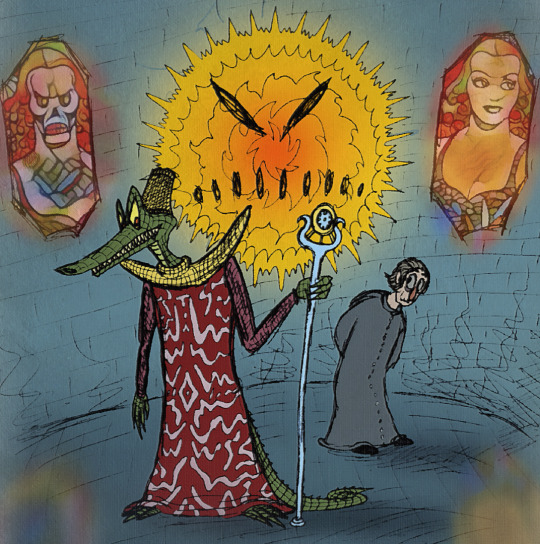
What better way to start off the year than with a very belated Christmas special? But it was belated for a good reason. The Man in Grey's Christmas Carol was an idea I thought up in July of 2023 when Aristide brought up the idea of using the Retconning Crocodiles in a minor way, and trying to figure out a plot to use them in somehow turned into the idea of doing a retelling of A Christmas Carol that gets derailed when the Ghost of Christmas Past learns that this year's Scrooge (our Man in Grey) didn't have a backstory, and so naturally they'd go to the Retconning Crocodiles to give him one.
The resulting story is to date the longest 925 Universe story, and I tried to incorporate as many ideas as I've had in the past about MIG (and some new ones just to mix things up a little), though of course a lot is not on the page. I don't personally want to answer every question about him, and neither does MIG really - as far as he's concerned, his life is what's on his CV.
It also ended up being quite a pivotal story in the 925 Universe, mainly because of the use of licensed DWU elements (really more just me liking the work of my friends and wanting to reference it with their permission) which means the Doctor Who wiki now has a page for a story that was first published on AO3... and that made me realise something. There were over 10 925 Universe stories at this point, and I was still using AO3 - my choice in platform when I specifically assumed this wouldn't be a series, let alone one with a 20k word novella that takes a detour to reference the Wold Newton Meteorite and Paul Shapera. That just wouldn't do...
But first:
The Noodle Man:

Yes, I had a hand in this. Wrote two short vignettes featuring Talbot Molossus (the 925 Universe Character I keep forgetting to use because I don't really have any funny ideas for him) and not the Noodleman (because I didn't really have any funny ideas for him). I was also the one who suggested the title of the anthology, fun fact, though I'm largely not very notable in this varied anthology from some very demented minds. It's also the first appearance of OMSCF!
The Nine-Two-Five Universe Website:
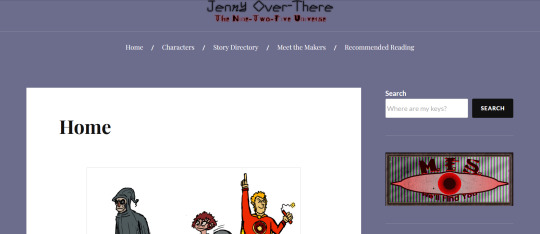
So, in-between writing various stories that haven't been released yet, I was chipping away at the next phase in the 925 Universe's strange evolution - a wordpress blog. I was of course taking lots of notes from The Crew of the Copper Colored Cupids (I even stole the lovely @aristidetwain for the illustrations) though, like any good plagiarist, I tried to change enough words to not get into trouble. For example, while they have a series of concise character bios that directly and effectively tell you about the characters, I...
Okay, so, like many problems, it started with the Man in Grey. I wanted to write a character bio for him, but also I'd just done a Christmas Special giving him this big backstory, and I don't want it to be spoiled for the unfortunate new readers, and also I didn't really want to write it all out again... so I instead opted to just make his bio his CV, which conveyed literal facts while also giving a sense of the character through the medium I used. I though this was fun. Naturally when I wrote Dynamite Thor's bio, I did it mimicking superhero origin stories, and with Jenny I gave her something normal because, well, she's the only normal person here... and that's why the character bios now have all these dumb gimmicks.
Initially I wanted this to all be out by the 2nd Anniversary, but the edits for the earlier stories were becoming more expansive, the character bios took up time, and eventually it became clear that I'd have to stagger the releases through the year, which would also mean I wouldn't be writing many new stories... a shame, but oh well.
Academy 27:
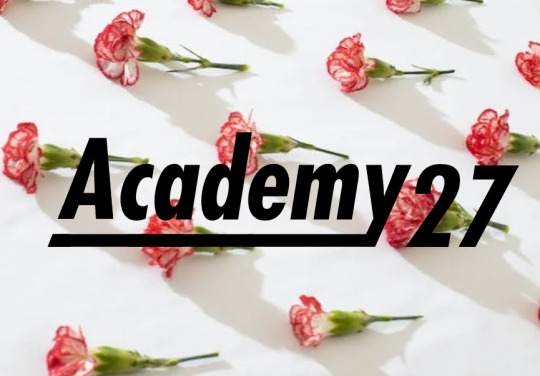
During this time, I also wracked up some more writing credits for the Academy 27 Series (a spinoff of the WARS TCG), with my main contribution being the story "Key Card" - a more thriller-inspired story about Midi being tormented by an evil Janitor robot. I also wrote a scene for an end segment for the story "Stage Blocking" (the one where the actors spend the whole seen fighting against a table with wheels - a very Goes Wrong Show-inspired bit), and I made the thumbnails for "A Kendo Story" and "Jae Hyun Puts on the Moves".
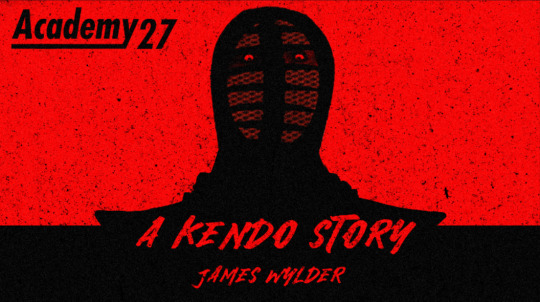
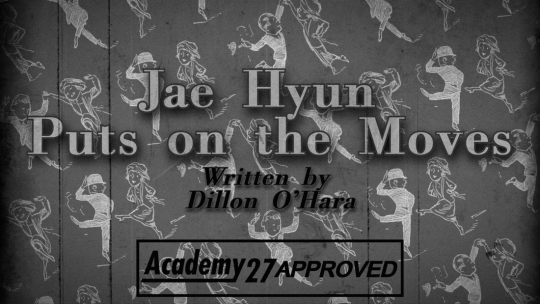
There is another story I contributed to that was meant to go out this year but, due to some Behind the Scenes complications, Academy 27 Season 2 was split, with my last story being in the second half of the second season (now Season 3)... so, look forward to that!
Super Speed Dating:
For a while, I wasn't planning to contribute to Jenny Everywhere Day 2024, just because I really didn't have the time for it... but I did it anyway. Part of it was admittedly because it was a good excuse to draw more eyes to the new 925 Universe Blog, but also it was a story I had been chipping away at for a while anyway, and it was, in-theory, quite short and plotless, so I could just write it out in a week and have it ready.
In-theory.
The story ended up being around 14k words long, partially due to an end segment that kept expanding as the series of aimless skits came together to form a chaotic battle against the very original character of Mike the Merciless. I also just can't shut up.
Also, fun fact - one of the characters in this story is a mean-spirited adult version of Little Orphan Annie (because she's public domain, and why the hell not) and, in a completely unplanned coincidence, this story was released near the 100th anniversary of the character. Leapin' Lizards, indeed.
The Crew of the Copper Colored Cupids Advent Calendar (2024):
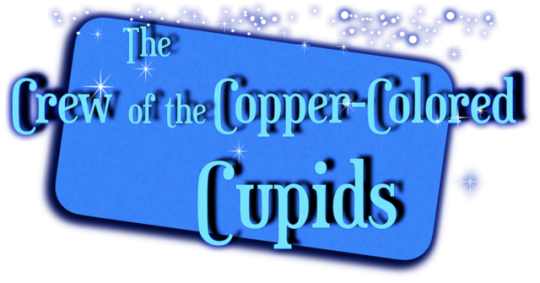
So, one cold, November Day, Aristide messaged me asking if I'd like to contribute a vignette to that year's Advent Calendar. Naturally I cautiously agreed to try to write maybe half a story... and then I wrote two. Really, three.
Merriment started off as a thing featuring Acquaintanceship-982 witnessing a scene from the end of a Christmas story and being very confused by it (especially this all-knowing character named "Mother Merriment" who would just be there as if she were a well-known Christmas character that everyone knew about)... that draft went nowhere though, so it got scrapped and replaced with Pythagoras-858 waking up in the small, Christmas-obsessed town you see in dozens of Hallmark Romance movies and slowly realising there's something weird about the citizens. Mother Merriment got carried over to this version, and her role got expanded to be like how many of these movies treat Santa (mainly because I was told not to use Santa).
Doctor Omega got some representation though (along with his two companions) in Doctor Omega's Last Minute, which also went through the sort of wild revisions you only see in a story where it's written very last-minute (it was December by the time I'd started it). At one point, I was planning on doing a parody of the Doctor Who episode "Kerblam!", but I thought it'd be a bit tacky to use the pre-existing 925 Universe parody, Kablamazon, so I replaced it with Argolis (a very timely parody of Argos)... and then I realised that doing a Kerblam! parody in general was a bit tacky, so I scrapped it all, but kept in Argolis as a driving force for the story.
This ended up ballooning to around 8000 words so, when I sent it in, it was suggested that it should be split into two parts. I agreed, partially because it artificially inflated the number of stories I've written for the Cupids, and partially because it gave me an excuse to change the format and introduce Professor Helvetius at an earlier point.
Two Sheep at a Standstill:
Back when I wrote Lawyers and Tigers and Bears, I felt a bit dissatisfied with how Dorothy and Ozma's story concluded. Sure, structurally there wasn't really a place for them to have a resolution, but I still wanted to give them one. That's why, when I was putting together the website, I also started writing "Two Sheep at a Standstill" (at the time "Two Sheep Standing Still in a Field"), a little thing where we see what their life is like outside the courtroom and also they kiss a bit.
This story actually went through more revision than I thought it would, mainly because of Ozma - the story alludes to the character's history quite a bit (of her childhood with Mombi and, more pressingly, her being trans) and, while I knew I was going to tread lightly with these topics, I still wanted to make sure I was not doing anything egregiously bad (and if I failed, I hope someone would tell me). In general with Ozma, I'm really more interested in this almost tragic element to her becoming a Queen - the idea that she was living such a terrible life and then, when she was finally free from it, she was in a position where she had to give so much of her life to others, and at a stage where she maybe wouldn't even be ready for it (don't make children monarchs, it never goes well)... but also, in a way, it shows the ultimate kindness of the character - that she'd surrender so much of her life in spite of what she's gone through.
Dorothy, similarly, is a character I had a lot of fun reimagining for the 925 Universe (there are quite a few Action Dorothies out there that are interchangeable, so I just had fun leaning into her protectiveness that we see in the books), and it was nice to write something where the characters could be happy with eachother, in spite of what they've gone through.
In short: Yay, gay people!
What Now?
As of now (with the exception of "The Rhino Tower"), all 925 Universe stories are up on the website, meaning I'm finally ready to move forward! I've learned at this point to not make strong plans with this series, as it keeps evolving faster than I can keep up with it, but I know that we will have a new story for the 3rd anniversary. I also have various personal projects I'm chipping away at (the Hook Book namely...) and there are stories I worked on this year that should hopefully be released at some point maybe. Who knows.
But anyway... thank you for putting up with all this waffling, and thank you for sticking by me for yet another year! Why did you do that? I don't know.
Thank you to @aristidetwain and @drleevezan, both of whom have been massively helpful to me this year (especially Aristide, who's done more illustrations for me than I'd ever reasonably ask of him, including many for character bios that haven't even been written yet), and thank you to @tardistogongen for enabling so many opportunities for me and others to write many stories.
I'd also like to give a shoutout to some fabulous new creative projects, headed by lovely people:
The Land of Elcarim - A series by @ranmagender that, much like the 925 Universe, features extensive crossovers from various public domain and open source characters (including some you might recognise from my work), but with a more metafictional approach that's very fun to read.
The Cheshire House - A repository for short stories by various authors set in and around the same universe. It features many people I've written with for Arcbeatle Press, and generally fits into the same Doctor Who-adjacent niche (though to call it a Doctor Who spinoff is to diminish the vast creativity that goes into this series).
And let's all, to the best of our abilities, survive 2025.
#my writing#925 universe#mop’s inane ramblings#jenny everywhere#jenny over there#public domain superheroes#writeblr#dynamite thor#land of oz#Dorzma#Dorothy Gale#Ozma#The Man in Grey#Academy 27#Arcbeatle Press#The Noodle Man
10 notes
·
View notes